
Catholics for Renewal
Subtitle
News 2021
Views expressed are those of the Authors and may or may not always represent those of Catholics For Renewal.
%20Pinterest%20Osnat%20Fine%20Art%20%20Into%20The%20Light.jpg)
Editorial: Plenary Council contributions and concerns
LIMITED EXTRACTS:
Ten years ago Catholics for Renewal urged the Australian bishops to convene a long-overdue plenary council in 2015, the 50th anniversary of the close of Vatican II. From the time they decided a Plenary Council was opportune we have made every effort to ensure it succeeds in renewing our Church. ...............we do have some serious concerns, some voiced publicly and others privately, that the Council is not adequately attending to the expressed needs of the people of God....
FULL EDITORIAL HERE Painting: Into the Light. Pinterest, Osnat Fine Art Previous Editorials HERE
Exploring Australian Indigenous Culture, Mission and Spiritualities
On the Agenda for the 5th Australian Plenary Council is this question: How might the Church in Australia open in new ways to indigenous ways of being Christian in spirituality, theology, liturgy, and missionary discipleship? How might we learn from the First Nations peoples? Fortuitously, a special webinar examining some of these issues has been organised by the Divine Word Missionaries and the ecumenical Australian Association for Mission Studies to take place on Saturday 2 October 2021, the eve of the Council Opening.
The webinar is FREE to attend. Details, Flyer and Registration on EVENTS page
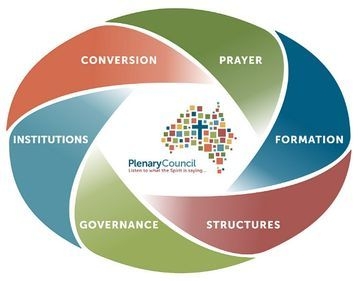
FIFTH PLENARY COUNCIL OF AUSTRALIA
AGENDA
Plenary Council, 18 June 2021
As children of God, disciples of Jesus Christ and guided by the Holy Spirit, the Members of the Fifth Plenary Council of Australia are called to develop concrete proposals to create a more missionary, Christ-centred Church in Australia at this time.
‘I dream of a “missionary option”, that is, a missionary impulse capable of transforming everything, so that the Church’s customs, ways of doing things, times and schedules, language and structures can be suitably channelled for the evangelisation of today’s world rather than for her self-preservation.’ - Pope Francis, Evangelii Gaudium 27
Download Agenda HERE
Pope Francis' push for synodality has further opened a process that will allow for the deconstruction of a long-outdated and anachronistic Church structure
Limited, edited, extract from Robert Mickens, Letter from Rome, subscription journal La Croix International, 18 June 2021
Nearly nine years I spoke to a civic group in Cleveland, Ohio, about the "Vatican implosion" and, as a result, the long and gradual collapse of the Catholic Church's monarchical structure of governance and ministry. I argued that as the last absolute monarchy in the West (and almost anywhere else in the world) the organization of the Roman Church has become an anachronism. It made sense when monarchies were a fundamental feature of human society. But no longer. This outdated model of the Catholic Church's structure no longer incarnates the reality of the lived experience of believers, the staggering majority of whom live in societies that are becoming more and more, and to varying degrees, participatory and representative democracies. A Church where the most important decisions are made almost exclusively by a celibate male clergy, and where bishops are held to little or no accountability, is unsustainable in a world where patriarchal and monarchical societies – begrudgingly, but steadily – are ceding rights and duties to those who are not part of the nobility, the clergy or one specific gender. My talk in November 2012 came during the height of the so-called VatiLeaks scandal. For more than a year the leaking of sensitive Vatican documents and the private papers of Benedict XVI had caused deep embarrassment to the still-reigning German pope and his top aides – especially Tarcisio Bertone SDB, the Cardinal Secretary of State at the time. Pope Francis hastens an inevitable collapse. It was a mess. And today one could look back and say: "Sure, it was easy back then for someone to spout off about a supposed Vatican implosion." Indeed, some people have since told me that the election of Pope Francis has revealed that my analysis was way off base. But nearly a decade later, I'm convinced that the thesis argued on that November morning on the shores of Lake Erie still holds. Because it was not based on what did or did not transpire in Benedict's pontificate. Even despite the kairos – the special, providential moment – that many Catholics believe we've been experiencing since the election of the first-ever Jesuit pope, the Church continues to implode. In fact, in some ways, Francis seems to be deliberately hastening its inevitable collapse by implementing the principles and methods outlined in Evangelii gaudium (EG), his vision and blueprint for Church renewal and reform. Let's be clear, we're not talking about the demise of the Catholic Church. God is not dead and the Holy Spirit will never leave Christ's faithful people. This we all believe. Changing structures and mentalities through synodality No, it's about the crumbling of the present governing and organizational structure, which continues to mirror certain features of the Roman Empire more than it reflects the organizational model of ecclesial life that is found in the New Testament or was experienced in the first couple of centuries of the Christian Church. Francis is effectively laying the foundation for the "deconstruction" of the current model by patiently planting the seeds for the Church's structural conversion by "baptizing" and employing four, key sociological principles (EG 222-237): -Time is greater than space; -Unity prevails over conflict; -Realities are more important than ideas, -The whole is greater than the parts. Ultimately the pope's goal is to make the structures and mentality of the Church more reflective of the Gospel and person of Jesus Christ and to liberate it from a codified system of rules and philosophical ideas still deeply wedded to the culture of the ancient Greco-Roman world. Through the process of synodality, he is opening up spaces for dialogue and discussion that involve all the Holy People of God and not just the male clerics. He is not democratizing the Church, but he is creating a large and indispensable forum for all voices to be heard through the classic, but too often forgotten, process of discernment....(Source)
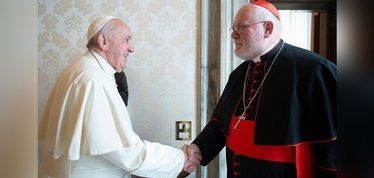
By Robert Mickens, Catholic Outlook, Diocese of Parramatta, 16 June 2021
The pope’s refusal to accept the German cardinal’s resignation further strengthens moves towards a substantial reform of the Catholic Church. Cardinal Reinhard Marx tried to resign but, in the end, Pope Francis rejected the move and instructed the 67-year-old German to continue leading the Archdiocese of Munich and Freising. The news is a major blow to doctrinal hardliners and neo-traditionalists, and everyone else who is a part of the Catholic Church’s “no change” crowd. Because Marx is not just any bishop or cardinal. He’s one of the most energetic and forceful proponents of ecclesial reform through synodality, a process of wide-ranging consultation of all the Church’s members that Francis is trying to make constitutive of Roman Catholicism. And the cardinal’s an extremely influential papal aide as member of the Council of Cardinals and moderator of the Vatican’s Council for the Economy. He’s also served from 2012-2018 as president of the Council of European Episcopal Conferences (COMECE) and until last year as head of the German Bishops Conference (DBK). In short, Reinhard Marx is a big player. And the Pope’s refusal to let him resign, has only made him all the more imposing as a leading figure in this current moment of Church history. From this point forward, everything is now different. By keeping Marx in place, Francis has endorsed the cardinal’s push for bold ecclesial reform and his desire to change a Church “system” that helped spawn the worldwide clergy sex abuse “catastrophe”. Marx said he agreed to withdraw his resignation “in obedience” to the Pope, but he made it clear that, from this point forward, everything is now different. “Simply going back to the previous agenda cannot be the way forward for me or for the Archdiocese,” he said on June 10, the very day Francis wrote him a warm and brotherly letter (in Spanish and German) telling him to continue in the post he’s held the last thirteen or so years. “For me and our joint work in the Archdiocese of Munich and Freising, this also means considering which new paths we can go — also in the face of a history of various failures — in order to proclaim and testify to the Gospel,” Marx said. A “dead end” Church that needs to be reformed The Cardinal revealed on June 4 — with the Pope’s permission — that he had sent in his resignation on May 21 in order to “share the responsibility for the catastrophe of the sexual abuse by Church officials over the past decades”. He insisted that beyond any personal failures, the abuse crisis was also the result of an “institutional or ‘systemic’ failure”. Marx said this “requires changes and a reform of the Church”, a Church he described as being at “a dead-end”. The Cardinal called out those in the Church who refuse to admit this and who “disapprove of discussing reforms and renewal in the context of the sexual abuse crisis”. “A turning point out of this crisis is, in my opinion, is only possible if we take a ‘synodal path’,” he said........(More). Photo: Pope Francis and Cardinal Reinhard Marx File Image Vatican News, Catholic Outlook 20210616
Pope Francis' US representative urges dialogue and unity
by Christopher White, Vatican, National Catholic Reporter, 16 Jun 2021
On the opening day of a closely watched and at times chaotic virtual meeting of the U.S. Catholic bishops on June 16, a majority of U.S. prelates voted to limit discussion on whether to proceed with drafting a contentious document regarding Communion and pro-choice Catholic politicians. Following months of open discord among the bishops about the necessity of such a document, the prudence of advancing it in a virtual format and a Vatican intervention urging caution, Pope Francis' U.S. representative encouraged unity and dialogue, telling the U.S. bishops that "If you want to go fast, go alone, if you want to go far, go together." "The starting point, therefore, cannot be to shame the weak but to propose the One who can strengthen us to overcome our weaknesses, especially through the sacraments of reconciliation and the Eucharist," said Archbishop Christophe Pierre, who has served as the papal nuncio to the United States since 2016. "We are not a church of the perfect but a pilgrim church in need of the mercy offered generously by Christ," the nuncio said.....(more)

Senior ecclesiologist warns that things could go terribly wrong at the Synod of Bishops next assembly if the listening stage is not carried out properly
Limited extract from George Wilson, US, Subscription Journal LA Croix International. 16 June 2021
In the large body of literature on the theme of leadership it has become almost trite to say that a good leader's first task is not to teach but to listen. That same wisdom applies to synods and synod-like projects. In Church language it is called "consulting the faithful". So it is encouraging to read that those designing this preliminary stage of the coming assembly of the Synod of Bishops have determined that "listening to the people of God" is the synod's first objective. Much depends, however, on (1) what such listening is designed to discover; (2) who is to be listened to; and (3) what processes are employed in that discovery. And the answers to those questions depends, first, on being clear just what a synod is. What is a synod? Pope Francis offers the mantra: "A body walking together." That is an attractive metaphor, to be sure. But if the three questions above are not carefully weighed before designing the first listening stage, "walking together" can be reduced to a warm fuzzy feeling, open to much mischief. How this first step is designed and executed can determine the success or failure of the whole venture. The fundamental issue Long years as a consultant/facilitator for several diocesan synods and many synod-like projects have led me to view a synod as a wisdom-seeking effort undertaken by the people of God under the guidance of the Spirit of Jesus at a particular era in its engagement with surrounding society. A synod is an assembly of the Church -- the People of God. That embraces persons who happened to be called to differing states of life within the community—ordained, lay or vowed religious. But they are all there by virtue of their baptism, in solidarity. Baptism is the only ticket of admission. The Spirit is poured out upon the entire baptized community. Any structuring of the synod that diminishes the sense of equal agency of all its participants will insure the failure of the enterprise.....(Source). Image: Lz Croix International 20210616
Dead end or no end? could synodality really be the "turning point"?
Limited extracts from Justin Stanwix*, Australia, Subscription Journal LA Croix International. 16 June 2021
Cardinal Reinhard Marx of Germany made a noble gesture when recently he tendered his resignation to Pope Francis. He stated his impression that the Church is "at a dead end". Quintessentially, he allowed the potential of a "turning point". That is the essence of Jesus' message. Thankfully, the cardinal's offer has been refused and for good reason. The pope reminded him that it remains time to tend the sheep. Probably more urgently than ever. The generosity and undoubtedly prayerful discernment that preceded the cardinal's offer must be acknowledged. The inherent rectitude and personal penalty involved as he shouldered vicarious responsibility for the sexual abuse crisis, in the interest of the whole Church, may appeal to many. A missionary Church that has made many mistake throughout history But his offer raises the question about how we see ourselves as Church. Even for a reason of generous proportion is it acceptable to offer to quit in such circumstances? No cavil about the sinful situation in which we find ourselves. My issue is about how we should respond, move forward and give example. How we live the Gospel message now. We are not solely individuals in our Church, the institution is not only human and its fundamentally divine nature is not of our making. We are a missionary Church and a pilgrim people. The People of God have accumulated plenty of missionary mistakes, repeated atrociously sinful behavior and have failed to learn even obvious lessons. We wasted no time after the death of Jesus in Beatitudes-absent behavior. Given the history of the two thousand years since, we are highly likely to engage in some lamentable repetition. At some point we must move beyond the sexual abuse crisis. Obviously, I don't mean ignore it or avoid the guilt, the shame and the ongoing responsibility we have in many ways to victims and families. The Holy Spirit is in charge As Church we have a rugged history. Our missionary Church has faced division, scandal and an abundance of challenge. The whole while we have been blessed by the presence of the Holy Spirit. No doubt at times the Spirit has shuddered but the promise of Jesus to be with his Church until the end of time is no mean promise. We may never gainsay that certainty because it is the Gospel message. We can celebrate prayerful and beautiful liturgies for the great occasions of our Church – or not. But we cannot ignore the Holy Spirit in our lives and his presence in our Church and in the world............The pope seeks to encourage a synodal Church where we work together collaboratively at all levels, abandon clericalism and monarchical structures and operate much differently from the way we do at present. In this context, the decision to defer the Synod of Bishops' assembly on synodality, while a world-wide consultation of the international Church takes place, must be embraced for the quantum change it represents.............(Source) *Justin Stanwix is a deacon at St. Mary Star of the Sea Parish in the Diocese of Wollongong (Australia).

Set of recent papers associated with proposed restructure of Melbourne Parishes, 11 June 2021
The set of linked papers below relate to recently proposed arrangements for restructuring Melbourne Parishes in response to changing demographics of parishes and the priesthood in the Melbourne Archdiocese. On 28 April Archbishop Peter Comensoli first spoke on this to a gathering of Archdiocesan clergy “The Way of the Gospel, Families of Communities” on restructure of Melbourne Parishes. His paper is linked below. On 22 May and supported by others from the Archdiocese office the Archbishop spoke on the same topic to a meeting of Lay representatives (one from each Parish). His presentation in text and slides are linked below together with a Pastoral Letter on the subject published on 23 May (Pentecost), together with a new Vatican Instruction from the Congregation for the Clergy “The pastoral conversion of the Parish community in the service of the evangelising mission of the Church” launched by the Vatican Press Office on 20 July 2020). Across the Church this Vatican Instruction has received mixed responses, including criticism by Robert Mickens (reflecting that of others, also linked below), Editor, La Croix International, 24 July 2020 “Not worth the paper it’s written on”, concluding from his analysis that "this new instruction on Catholic parishes is latest proof it will be hard to wrest control from the clericalists": (Image: manorparish co uk)
- Talk by Archbishop Peter Comensoli to gathering of Archdiocesan Clergy, 28 April 2021
- Presentation (Text) by Archbishop Peter A Comensoli to Parish lay leaders, 22 May 2021
- Presentation (slides) by Archbishop Peter A Comensoli Parish lay leaders. 22 May 2021
- Pastoral Letter (Pentecost 2021): "Take the Way of the Gospel”, 23 May 2021
- Vatican Instruction: "The pastoral conversion of the Parish community in the service of the evangelising mission of the Church" (from the Congregation for the Clergy), 20 July 2020
- Robert Mickens Review of Instruction: The pastoral conversion of the Parish community......, 24 July 2020
Limited extracts from Staff Reporter, Subscription Journal, Catholic Herald UK 11 June 2021
“In obedience, I accept [Pope Francis’] decision, as I promised him,” said Cardinal Reinhard Marx in a statement following the pope’s decision to reject his resignation as head of the Archdiocese of Munich and Freising. Cardinal Marx offered to resign his See in a “confidential and personal” letter to the pope that was later made public with the pope’s permission. In his letter, Marx said, “It is important to me to share the responsibility for the catastrophe of the sexual abuse by Church officials over the past decades.” Cardinal Marx acknowledged that his own silence, neglect, and overemphasis on the reputation of the Church made him “personally guilty and responsible,” but also stressed the importance of accountability for “institutional and systemic failures.” In a personal statement released when the letter was made public, he added, “As a bishop, I have an ‘institutional responsibility’ for the acts of the Church in its entirety as for its institutional problems and failures in the past.” Although agreeing with Cardinal Marx’s characterisation of the sex abuse crisis as “a catastrophe,” and on the importance of accepting responsibility for the crisis, Pope Francis refused to accept his resignation, instead asking him to stay on as Archbishop of Munich and Freising, confirming his mission and asking him to continue to work for “a spiritual renewal” in the Church.”.......... He described the pope’s decision as “a great challenge” and insisted “after that, simply going back to the agenda cannot be the way for me, nor for the Archdiocese.” He said that, with the faithful of the Archdiocese, it was necessary to consider “which new paths we can travel,” saying that “in the next few weeks about how, together, we can contribute even more to the renewal of the Church here in our diocese and as a whole,” especially as the pope essentially agreed with his analysis, as well as providing “important impulses” for reform....(Source)
Extract from CathNews, The Tablet, 11 June 2021
Pope Francis has refused Cardinal Reinhard Marx’s offer to resign over the sexual abuse crisis, saying although the German prelate had been courageous in taking responsibility for past scandals, he should stay in office. Cardinal Marx has not been accused personally of mishandling cases but in a decision that sent shockwaves across the Church, he submitted his resignation to the Pope over institutional failings. The 67-year-old cardinal, who is eight years off retirement age, set out his reasons for stepping down in a letter on May 21. In his response, Francis agreed with the cardinal that the abuse crisis has been a “catastrophe” and that “each Bishop of the Church must take it up and ask himself what should I do in the face of this catastrophe?” This includes, the Pope said, making a “‘mea culpa’ in the face of the many historical errors of the past … and before the many situations, even if we have not personally participated in that historical situation.” The Pope praised Cardinal Marx’s offer to step down which he says displays a “Christian courage that does not fear the cross” and that reform in the face of the abuse crisis cannot consist merely of “words” but putting one’s life on the line. Jesus’ reform, Francis pointed out, is not contained in a particular religious project but is witnessed to “with his flesh on the cross”. Francis went on: “And this is the path, the one that you yourself, dear brother, assume when you present your resignation.” Nevertheless, the Pope said he would not accept Cardinal Marx’s offer. “That is my answer, dear brother. Continue as you suggest, but as Archbishop of Munich.”........(More).

Extracts from Daniel P. Horan, National Catholic Reporter, 9 Jun 2021
The West African country of Ghana is one of the most homophobic countries in the world today. It not only refuses to recognize same-sex unions, but it also criminalizes consensual same-sex acts with imprisonment of up to three years. Those who are arrested for being gay are then often subjected to further physical, psychological or sexual abuse as a result of their captivity. A 2018 Human Rights Watch report documents numerous accounts of horrendous anti-LGBTQ abuse and "corroborates that LGBT people are often victims of mob attacks, physical assault, sexual assault, extortion, discrimination in access to housing, education and employment, and family rejection on the grounds of their sexual orientation or gender identity. In an environment in which homophobic views abound, and few are willing to publicly come to the defense of LGBT people, it is easy for violence to flourish." Not only have LGBTQ individuals been targeted, harassed, denied basic human rights and assaulted because of their sexual orientations or gender identities, but those who have sought to advocate on their behalf through education programs or resource centers have now become the target of comparable treatment and discrimination. In February, Kojo Oppong Nkrumah, a member of parliament and the Ghanaian minister for information, went so far as to propose formal legislation that would make advocacy on behalf of LGBTQ persons illegal.......According to the 2010 census, more than 70% of Ghanaians identify as Christian, making the rampant homophobia and anti-LGBTQ attitudes, laws and violence an inherently Christian problem. In an interview with the BBC, Anima Adjepong, a Ghanaian sociologist who is based in the United States, said: "The church also advances this argument that queer people in Ghana are abhorrent. And really the church promotes violent discourse against queer people about 'throwing them into the ocean', about how they 'don't belong here', about how they're 'bringing the downfall of the society'."....(more). Photo: business area Accra Ghana, CNS Luc Gnago Reuters, NCR 20210609

Words of regret and acts of penance are not enough to heal the wounds and right the Church
LImited extract from Massimo Faggioli, subscription journal La Croix International, 8 June 2021
The Catholic Church enjoyed a bit of a renewed honeymoon with the global media after the May 21st announcement of the "synodal process 2021-2023". But the love fest lasted only about a week. It was brought to an abrupt and ugly end when law enforcement officials in Canada discovered 215 unmarked graves of indigenous children at a former Catholic-run residential school in British Columbia. International organizations quickly demanded that the Church in Canada and the Holy See admit responsibility for the tragedy. Pope Francis expressed his "closeness with Canadians traumatized by the shocking news", as he addressed pilgrims in St. Peter's Square at last Sunday's Angelus. But he stopped short of issuing a direct apology. June 4th, that fateful day Canada's Catholic Prime Minister, Justin Trudeau, insisted that the Church and the Holy See must take responsibility for what happened at the school. In a video statement on June 4 he even alluded to the possibility that Church officials could be taken to court. That just happened to be the very same day that German Cardinal Reinhard Marx made the shocking announcement that he had asked the pope several days earlier to accept his resignation as archbishop of Munich and Freising......... The future will continue to be an elusive idea in the Church if the elevation of the existential dimension of the faith becomes just verbal esthetics; and if the pastoral dimension becomes clerical mannerism and thus the instrument for an institutional apologetics, a defense of the status quo, as Italian theologian Marcello Neri has noted in his latest book. But that very well could happen to the synodal process if it is not open to institutional and theological reforms in response to the abuse crisis. It is not clear whether courageous reform will get the Church out of its current predicament. But it is certain that, without such reform, the Church hardly stands a chance....(Source). Image: La Croix International, 20210608
Extract from Kieran Tapsell, 8 June John Menadue website, 8 June 2021
One of the main reasons for the Catholic Church shifting around abusive priests was because its disciplinary system was dysfunctional. Far more children were abused than would have occurred if it had a decent one. The Royal Commission made recommendations for change, and Pope Francis has adopted some of them, but he has retained two of the most harshly criticized canons. In its 2017 Final Report, the Australian Royal Commission into Institutional Responses to Child Sexual Abuse made recommendations for the reform of canon law, including the abolition of the pontifical secret over child sexual abuse by clergy, initiated by Pope Pius XI in 1922. In December 2019, Pope Francis abolished it. The Royal Commission also criticized the canonical disciplinary system which made it virtually impossible for abusive priests to be dismissed. On 1 June 2021, when announcing the changes to that system in Book VI of the 1983 Code of Canon Law, a Vatican spokesman said, “In many places, punishments were mentioned only as a possibility, and the whole text gave the impression that it was almost merciless to apply punishments…Today…due to the examination of the abuse of minors, the atmosphere is different.” The purpose of this article is to examine how much has changed. Child Sexual Abuse as a “Moral Failure” The Royal Commissioners were baffled by evidence given by Church leaders that they considered child sexual abuse to be just a “moral failure,” a view reflected and reinforced by the Code of Canon Law which included it in a section dealing with breaches of celibacy, as if it were no different to masturbation or a consensual affair with an adult. The Royal Commission’s Recommendation 16.9a was that child abuse should be “articulated as canonical crimes against the child, not as moral failings or as breaches of the ‘special obligation’ of clerics and religious to observe celibacy.” The Vatican has adopted this recommendation and has now listed child sexual abuse in the section for “offences against human life, dignity and liberty.”..............(more)
"I would like to show that not the ministry is in the foreground but the mission of the Gospel,"
Extract from Joshua J. McElwee, National Catholic Reporter, Jun 4, 2021
Rome — German Cardinal Reinhard Marx, one of Pope Francis' closest advisors, has asked the pontiff to allow him to resign as the leader of the Archdiocese of Munich and Freising as a sign of responsibility for the "systemic failure" of Catholic Church leaders over decades in responding to clergy sexual abuse. In a shocking letter to Francis, which Marx released to journalists June 4, the cardinal says he wants to "share the responsibility" for the way priests and bishops mishandled abuse cases. He also admits he feels "personally guilty" for trying to protect the reputation of the church when dealing with victims. "To assume responsibility, it is … not enough in my opinion to react only and exclusively if the files provide proof of the mistakes and failures of individuals," writes Marx in the letter, dated May 21. "We as bishops have to make clear that we also represent the institution of the Church as a whole." In resigning, states the cardinal, "I may be able to send a personal signal for a new beginning, for a new awakening of the Church, not only in Germany." "I would like to show that not the ministry is in the foreground but the mission of the Gospel," Marx tells Francis. "I therefore strongly request you to accept this resignation." Marx has led his archdiocese since 2007. He also serves as one of only seven members of Francis' advisory Council of Cardinals and as the coordinator of the Vatican's Council for the Economy, which supervises the financial activities of both the Vatican city-state and the offices of the Holy See. The cardinal is 67-years-old, eight years shy of the traditional retirement age of 75 for bishops. His decision to resign over the actions of the church as a whole on clergy abuse, and not because of any known investigation into his personal actions, appears without precedent............In a personal declaration to journalists sent alongside the copy of Marx's letter to Francis, the cardinal said the pope had authorized him to release his letter and told him to "keep performing my service as bishop until [Francis'] decision is made.".....(more). Photo: Cardinal Reinhard Marx CNS photo Harald Oppitz KNA, NCR Online 20210604
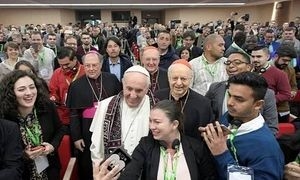
Extract from CathNews NZ, CNS, 3 June 2021
There are many ideas about what synodality means, says Pope Francis. “It’s not a walk in the park”. It is “an ecclesial journey that has a soul, which is the Holy Spirit. Without the Holy Spirit, there is no synodality,” he explains. Francis is promoting a synodal process that involves the whole church. It will focus on listening to one another and to the inspiration of the Holy Spirit. Last month, he approved major revisions to how the Synod of Bishops will work. It should begin with a bottom-up full diocesan-level process of consultation, he says. “This will require patience, work, allowing people to talk so that the wisdom of the people of God will come forth … “A synod is nothing other than making explicit what ‘Lumen Gentium’ says: “The whole people of God — all of them, from the bishop on down — is infallible in belief. They cannot err when there is harmony among all.” Listening and consultation may require managing a range of expectations or fears. It may involve explaining to people who want immediate, radical change that discernment takes time and requires fidelity to God’s will. It may involve explaining to those scandalised by the questions they are being asked that perhaps there are better ways to explain church teaching and live the Gospel. Francis often underlines that a synod is not a parliament, but a process of discernment. St. Paul VI, who revived the Synod of Bishops for the universal Catholic Church, also made this point. Over the past five decades, that special nature has increasingly involved laypeople, religious and priests. They are now consulted before bishops are elected or appointed to attend the synod assembly. To support the pope’s wish to imbue the church with a synodal spirit, the International Theological Commission published a document in 2018: “Synodality in the Life and Mission of the Church.” It explains that synodality promotes the baptismal dignity and call of all Catholic and values the presence of different gifts given by the Holy Spirit. It also recognises the specific ministry entrusted to pastors and bishops in communion with the pope for the preservation of the faith and the renewal of the church.......(More). Photo: Pope Francis and people synodality Crux Now, CathNews NZ 20210603
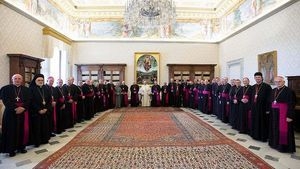
Extract from The Record, Archdiocses of Perth, 3 Jun 2021
Formation, becoming more missionary and fostering collegiality have been identified as the top three priorities by Australia’s Catholic bishops. In a recent week-long process of prayer and discernment, the three priorities were identified as a means to guide the work of the Australian Catholic Bishops Conference, and arose following a structured review of Conference operations and financing in 2019.
Earlier this year, the bishops were guided through a process of shared discernment, punctuated with prayer and conversation, by Br Ian Cribb SJ. Br Ian had earlier led the retreat the bishops made together immediately before their 2019 Ad Limina Apostolorum visit. Following the three sessions, which involved the identification and ranking of possible priorities, the bishops approved the three priorities at their recent plenary meeting. “It is important to note that these are priorities for the Bishops Conference to pursue, which includes the various bishops commissions, the work of the general secretariat and the biannual plenary meetings,” Bishops Conference President, Brisbane Archbishop Mark Coleridge said. “These were not developed to be priorities for the Catholic Church in Australia, though many dioceses, parishes and other ministries are no doubt focusing on one or more of these priorities.” The Conference’s ongoing priorities are also reflected in the work of its nine bishops commissions and two episcopal panels, which will take on new focus in light of the new priorities named. Archbishop Coleridge said the Fifth Plenary Council of Australia will have an important role in shaping priorities for the Church nationally. “We’ve already seen during the three years of the Council journey so far how key topics and concerns are being identified, and the Council assemblies will help refine those further,” he said. “These priorities we have developed specifically for the Bishops Conference will help the work we undertake as a college of bishops, to make important decisions and to tread a path that pursues formation, collegiality and a missionary disposition.”......(More). Photo: Australian Catholic Bishops 2019 Ad Limina, CNS, The Record 20210603 [Ed: are formation, becoming more missionary and fostering collegiality all there are to hope for in renewal of a declining Australian Catholic Church?] Photo: Australian Catholic Bishops Pope Francis 2019 Ad Limina, CNS, The Record 20210603
All New Zealand Catholics will get a say in upcoming synod
Extract from CathNews NZ, 3 June 2021
The
NZ Catholic Bishops’ Conference says the views of all New Zealand
Catholics will be sought during an expanded Synod of Bishops’ process
announced by the pope. Pope Francis
has frequently called for the bishops, priests and people to walk
together in a common mission of the Church,” says Conference president
Cardinal John Dew. “He believes it is imperative to listen to the People of God, which means going to local churches to hear what they say.” Francis
wants all Catholic dioceses to consult with parishioners from 17
October to get local-level views on the topic for the next synod,
entitled a “Synodal Church: Communion, Participation and
Mission”. “The Holy Father wants to hear the voices of all the
baptised,” Dew says.......Most of these
people consider they are no longer regular parishioners and wonder how
limiting the process to going to parishes and consulting parishioners
will work. Jerome De Rosario is a
40-year-old Wellington professional. A “retired catholic”, he thinks the
Church needs a different strategy and fresh ideas and hopes the Synod
might accomplish this. However, he
expressed surprise the Church did not factor in what it already knows,
that most Catholics don’t belong to parishes and do not go to
Mass. Alex Jordan, a university student from Massey, Auckland, also picks up on the parish emphasis. “The
voice of the bulk of baptised Catholics won’t be heard because they
don’t belong to the outdated parish structure, he said. “At most, they’re gathering 5% of the baptised. “The data will be skewed from the outset”, he said. “If this is worth doing it’s worth doing well. I hope the Church gets good advice.” Non-parishioners also need to be considered says Richard McKenna, a 30 something manager in Wellington. “By focussing
on parishes many people who are still fringe Catholics but not regular
parishioners, and may feel excluded. This statement seems to confirm our
exclusion”. He hopes it is not the
‘last word’ and the criteria and methodology will also consider
non-parishioners may wish to contribute and have valuable ideas.
“I much prefer the Vatican’s focus, consulting with ‘The People of God'”, he said.....(more).
Extract from Rod Page, Pearls & Irritations. John Menadue website*, 31 May 2021
There’s a Plenary Council coming up in October 2021 and it is slated to be an opportunity for renewal for the Catholic Church in this country.But is there room for dialogue when evan an Archbishop is gagged? At such a critical time in the history of the Church, however, it is disheartening that some of its media remain inwardly focused and, in a recent case, brazenly censored. This ensured that reformist views of a long serving bishop were gagged. Six months ago (June 2020) the Archdiocese of Canberra and Goulburn’s official publication The Catholic Voice published online a feature article on Archbishop Francis Carroll, who is retired and lives in Wagga Wagga, NSW. Within a day, however, his thoughts on issues around church renewal were selectively taken down, and parts removed altogether. The journalist, also The Catholic Voice’s Editor at the time, was not informed of the deletion of these key components of her article. The initial (pre-censored) version of her interview, headlined ‘Strong views from bishop with farm-boy charm’, was a warm and encouraging account of 90 years’ of wisdom, the outlook from an esteemed pastoral elder. The long-serving Archbishop of Canberra-Goulburn (1983-2006) shared in this interview of the rich joys he had experienced and promulgated as a result of Vatican II. The report of his ‘strong views’ included many matters, dear to the hearts of Catholics across Australia, indeed across the world. Yet these views were expunged, and the new headline became ‘A bishop with farm-boy charm’. No more ‘strong views’. The reporting journalist’s commitment, integrity and professional objectivity inherent in the initial report were given a back seat. Evidently, a censor had decided that Fr Francis’ thoughtfully expressed wisdom on church reform should be kept under wraps. Some will recall that Francis Carroll openly reflected on reform when he was President of Australian Catholic Bishops Conference some 20 years ago. Hence, unremarkably, the thrust of his current (censored) views on reform is echoed in a huge proportion of the 17,457 Plenary Council submissions from other Australian Catholics.....(More). *[Ed: This is an update to the author’s recently published article in ‘The Swag’ – quarterly magazine of National Council of Priests of Australia – Autumn 2021.

Cardinal Tobin explains Pope Francis's vision of synodality
Limited extract from subscription Journal La Croix International, (originally published in Commonweal), 29 May 2021
............Communion, participation, and mission The longer and further we journey together, the more we encounter together, the clearer things become. Of the words that keep coming up along this journey of the bishop of Rome and the People of God together—mercy, joy, discernment, formation, dialogue—the most misunderstood is "synodality." By now, "synodality" is a word closely associated with this papacy. Francis keeps calling for a more decentralized Church, one marked by collaboration and consultative decision-making, a functionality we generally associate more with the horizontal structures of the churches of the East than the top-down Roman hierarchy of the West. In eight years, the pontificate of Francis has featured five synodal gatherings -- including the 2014 and 2015 Synods of Bishops on the Family, which explored the essential evangelizing role of the family and the human problems that can get in the way, all of it masterfully summarized in his beautiful exhortation, Amoris laetitia; the Synod on Young People in 2018, which sought to better integrate young people's journeys and struggles into how we as a Church accompany them; and the 2019 Synod on the Amazon, which centered voices from the world's peripheries and gave us a crash course in how pernicious the forces of exclusion can be toward these brothers and sisters in Christ. And now, on a date soon to be announced, there will be a synod on the theme "For a synodal Church: communion, participation, and mission." A skeptic might ask, "A synod on synodality? Isn't that the epitome of what Pope Francis warns us about when he knocks the Church for being too 'self-referential'?" But I would contend that the gathering is essential for our shared growth as the Body of Christ, to be more aware and intentional in our adoption of what Pope Francis sees clearly—and advocates for openly—as the model of Church that the Lord expects from us in this millennium. A millennium: even in Church terms, that is what we call the long game. But synodality is indeed the long game of Pope Francis. It is a process that will challenge us and will require changes in what we are as Church. What we will find is that synodality is a focus on the journey of the Body of Christ through history, a journey that fosters ongoing conversion and, ultimately, calls us to mercy.....(source). Photo: Pope Francis the-long-game-14388-69. Vatican Media, La Croix International 20210529
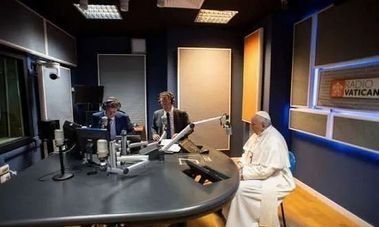
Limited extracts from Robert Mickens, Letter from Rome, subscription journal La Croix International, 28 May 2021
It was supposed be a day to celebrate the glories of Vatican Radio and L'Osservatore Romano.Instead, it quickly turned into an embarrassing nightmare. The more than 300 employees in the Vatican's Dicastery for Communication (sic.) -- which includes the radio, paper, press office and the internet site Vatican News, among others -- anxiously awaited words of congratulations and encouragement on May 24 when Pope Francis made an hour-long visit to their headquarters. But what they got, instead, was a scolding. And it wasn't pretty. The pope -- in a "live" radio interview, no less! -- wondered aloud if there was even anyone out there listening to the Vatican's radio station or reading its newspaper. "How many listen to the Radio, and how many read L'Osservatore Romano?" he asked. And it only got worse from there. A grumpy old pope? The reason for his visit was to mark Vatican Radio's 90th and the newspaper's 160th anniversaries. He never mentioned either milestone. Rather, he compared the costly multi-media department -- of which the two entities are essential components -- to a mountain that gives birth to a mouse!...........Francis was in a grumpy mood throughout the visit and was still testy several hours later when he had a go at the Italian bishops who were gathered for their plenary assembly at a big hotel-conference center. After being greeted by the finely attired prelates, he said: "When I came in I had a nasty thought, forgive me: is this an assembly of bishops or a contest to choose the most handsome bishop?" Then he proceeded to scold them, too. He said they must be suffering from "amnesia" because they "had forgotten" to follow up on the extremely clear instructions he gave them in November 2015 to begin a synodal process to reform the Italian Church. You don't have to do a lot of speculating to figure out the reason for the pope's frustration with the bishops' conference or his own multi-media department. The first is not doing what he's asked of it. And the second is.........(source). Photo: Pope Francis Vatican Radio VATICAN MEDIA HANDOUT EPA MAXPPP La Croix Int 20210528
Limited extracts from Youna Rivallain, subscription journal La Croix International, 28 May 2021
Swiss Bishop Charles Morerod of Lausanne, Geneva and Fribourg (LGF) has appointed a lay woman, a layman and a permanent deacon as "episcopal delegates" in three areas of the diocese. In order to carry out this small revolution, the 59-year-old bishop changed entities that were previously vicariates into "diocesan regions". In French-speaking Fribourg, Céline Ruffieux, a pastoral worker, teacher and psychologist, replaces Rev. Jean Glasson, who has been serving as episcopal vicar..........Bishop Morerod, a Dominican theologian who has headed the LGF diocese since 2011, explained the new appointments by noting that the Church is everyone's business. "I hope when people look at the Church, they can see Jesus, see his active presence. It is the responsibility for all Christians. It is not a matter of dealing only with structures, but of being witnesses," he told the Swiss Catholic website Cath.ch The desire to give greater responsibility to the laity is also motivated by the reality of the lack of dynamism in certain regions. "First of all, I want priests to be able to collaborate in their own pastoral role by developing pastoral hubs, rather than being assigned to organizational tasks," said Bishop Morerod who was rector at the Pontifical University of St. Thomas ("Angelicum") from 2009-2011. The two Swiss priests who are moving out of the episcopal vicar's post will be responsible for developing pastoral centers in parishes.....(source)

Extract from CathNews, 25 May 2021
The Australian Catholic Bishops Conference has formally convoked the Fifth Plenary Council of Australia, with its president, Archbishop Mark Coleridge, signing the required decree on Pentecost Sunday.
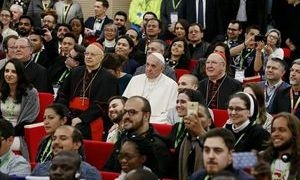
Extract from CathNews, CNS, 24 May 2021
Pope Francis has approved the revision of the entire process of the Synod of Bishops and asked that it begin with widespread consultations with the laity at the diocesan level. “In reality, without this consultation there would be no synodal process, because the discernment of pastors, which constitutes the second phase, emerges from listening to the people of God,” Cardinal Mario Grech, secretary-general of the Synod of Bishops, told Vatican News on Friday. The Cardinal’s office issued a statement explaining how the next general assembly of the Synod of Bishops would work, noting that the broader consultation on the diocesan, national and regional levels would mean that the gathering of representative bishops from around the world would take place at the Vatican in October 2023 rather than in 2022, as previously scheduled. The theme chosen by Pope Francis for the gathering is: “For a synodal church: communion, participation and mission.” The Pope will formally open the synod process at the Vatican, on October 9-10, the synod office said. And the bishop of every diocese will open the process in his diocese on October 17. The diocesan phase will go through to April 2022, featuring a consultation with local Catholics discussing a preparatory document and questionnaire that the synod office will send out along with guidelines for how the consultation should work. Once the diocesan consultations have concluded, members of national bishops’ conferences should have “a period of discernment” so they can “listen to what the Spirit has inspired in the churches entrusted to them”. A synthesis of that reflection should be sent to the Vatican’s synod secretariat by April 2022. The new indications also envision “continental” reflections between April 2022 and March 2023. All the listening sessions and discernment are meant to assist participants, mainly bishops, who will meet at the general assembly of the synod in October 2023, the Cardinal said......(more). [ED: a notable similarity with the currrent Australian Plenary Council approach. It's most likely that outcomes of the 5th Australian Plenary Council commencing this October will be widely watched across the whole Catholic Church].
Extract from Christopher R. Altieri, Catholic Herald, 21 May 2021
Pope Francis has postponed the synod on synodality and added several levels of complication to the preparations, which will now stretch over a period of two years and involve local Churches, whole continents, and persons in every state of life. The XVI Ordinary Assembly of the Synod of Bishops will now take place in Rome in October 2023, a full year later than originally planned. Pope Francis approved the new programme for the XVI Ordinary Assembly of the Synod of Bishops on 24 April 2021. The Press Office of the Holy See gave news of the changes through a note from the General Secretariat, issued on Friday, 21 May 2021. “This path toward the celebration of the Synod comprises of [sic] three phases,” the note reads, “between October 2021 and October 2023,” listed as “a diocesan phase and a continental phase that will give life to two different Instrumentum Laboris [sic], and finally a conclusive phase at the level of the Universal Church.” Really, the synod itself is now a two-year process, as the Secretary General of the Synod of Bishops, Cardinal Mario Grech, explained in an interview with the official Vatican news portal. “The fact that this phase is called preparatory could be misleading,” Cardinal Grech told Andrea Tornielli of Vatican News, “as if it were not truly part of the synodal process.” “In reality,” Cardinal Grech continued, “without this consultation there would be no synodal process, because the discernment of pastors, which constitutes the second phase, emerges from listening to the People of God.” “The synodal process was not thought up in some office away from reality,” said Cardinal Grech, whose department was responsible for designing the new process in their Rome offices. “[R]ather it emerged from the journey of the Church throughout the post-conciliar period.” Cardinal Grech also explained that the great innovation Pope Francis has introduced, is a way of thinking about what a synod is, and isn’t: “The first and greatest innovation is the transformation of the Synod [sic] from an event into a process.” “Synodality,” Cardinal Grech told Vatican News, “offers us an adequate framework for understanding hierarchical ministry, especially the Petrine ministry.” Quoting Pope Francis to the effect that the pope is not above the Church, but a member of the Church and a bishop among bishops, who is nevertheless, “called at the same time – as Successor of Peter – to lead the Church of Rome which presides in charity over all the Churches.” “The synodal process,” said Cardinal Grech, “is the litmus test of this truly high vision of the Church.”....(more).
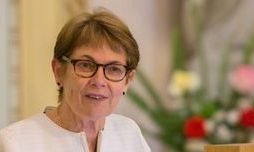
This report on women’s safety in the workplace has implications for the Catholic Church in Australia as we journey towards the first Assembly of the Plenary Council.
Extract from Sister Patty Fawkner SGS, Sisters of the Good Samaritan, 20 May 2021
Admittedly, I have only read the 40-page Executive Summary and Recommendations rather than the entire 995-page Australian Human Rights Commission report, Respect@Work: National Inquiry into Sexual Harassment in Australian Workplaces. Though delayed for more than 12 months, the release of the report is timely given the plethora of allegations of sexual harassment and abuse within the walls of Federal Parliament. The report does not specifically examine sexual abuse within Church workplaces. However, it does shine a light on women’s safety within workplace cultures such as the Catholic Church. The report notes (pp 20-21) that workplace settings where there is a higher risk of experiencing sexual harassment include those that are male dominated due to: the gender ratio; the over-representation of men in senior leadership roles; the nature of the work being considered ‘non-traditional’ for women; the masculine workplace culture; being organised according to a hierarchical structure. Even though the gender ratio favours women in the pews and in many Church ministries, the Respect@Work findings indicate that the Church is potentially a very unsafe place for women. Senior leadership roles in the Catholic Church are exclusively male; it is considered “non-traditional”, indeed “divinely forbidden”, for women to be ordained leaders; and the Church is hierarchically structured in the extreme. The Catholic Church is intrinsically male dominated in its leadership, governance, liturgy and language. The dangers that inhere in Church workplace settings was borne out for me when I participated in an online International Women’s Day event run by the Voices of Faith organisation in March this year. Differing from the usual diverse group of speakers, this year’s event, called Sisters Unveil Your Truths, asked Religious Sisters from around the world to reflect on their experience of obedience....(more). Photo:Sister Patty Fawkner SGS. Sisters of the Good Samaritan, 20 May 2020
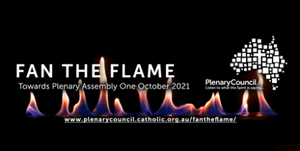
Extract from CathNews, ACBC Media Blog, Plenary Council, 19 May 2021
People across the country are being invited to join a months-long prayer campaign in the build-up to the first assembly of the Fifth Plenary Council of Australia. Due to launch this weekend on the Feast of Pentecost, “Fan the Flame” will allow for people in any context to engage with Scripture, papal writings and documents prepared for the Plenary Council in bringing a focus to their prayers for the October assembly and beyond. Archbishop Timothy Costelloe SDB, president of the Plenary Council, said prayer has been central to the journey of the Council over the past three years. The Fan the Flame campaign invites “prayer partners” to invoke the Holy Spirit’s ongoing guidance. “Drawing upon the wisdom of a national liturgy committee and the powerful experience of local prayer campaigns, Fan the Flame provides resources for individuals or groups of any size and type to pray for the Council,” Archbishop Costelloe said. The campaign material has resources for each week from Pentecost until the 26th Sunday in Ordinary Time – the final weekend before the first assembly of the Council.....Details.....(more). Image:Fan the Flames, Plenary Council, CathNews 20210519

Pope Francis hopes that this week dedicated to Laudato Si’ will rekindle the energy the encyclical contributed to protecting the environment.
Extract from Andrew Hamiltom SJ, Catholic Outlook, CathNews 19 May 2021
Laudato Si’ Week, May 16 to 25, coincides with the annual School Climate Strike on Friday and occurs shortly before World Environment Day on June 5. The timing is happy because all these events emphasise the urgency of care for the environment. At a time when the number of people affected around the world by coronavirus is still growing rapidly, it is helpful to reflect on the large themes of Pope Francis’ appeal to the world in Laudato Si’. They also illuminate the challenges we still face in responding to the virus. Pope Francis’ letter was significant for the urgency and authority it gave to the campaign to address global warming and the pollution of the natural environment. In writing his letter, he sought reliable scientific advice, as later did most governments in response to coronavirus. He showed that to do nothing or to make the environment an optional extra to economic policy was not an acceptable option. It threatened the future of the world that we shall hand on to our children. He also insisted that care for the environment is not only the business of economics or politics. At its heart, it is a religious duty. It is part of doing God’s will to make our world one in which people can flourish.....(more) Image: One World, Unsplash Markus Spiske, CathNews 20210519

For the second consecutive year, a nationwide "Preacher's Day" in Germany pushes for Catholic women to be allowed to give homilies during Mass.
Limited extract from Delphine Nerbollier, subscription Journal La Croix International, 18 May 2021
The effort is intended to be highly symbolic. Ulrike Göken-Huismann, a 59-year-old theologian and president of the Catholic Women's Association of Germany (KFD), preached at Mass last Monday in the Church of St. Maximilian in Düsseldorf in western Germany. In fact, she has regularly given homilies at Services of the Word since 1988, which is normal practice throughout the country. But this was different. For the second year in a row, she was one of twelve women in twelve different locations who took part in this May 17 nationwide action called "Preachers' Day". "Our goal is to make it clear that women can preach and can do it well," says Göken-Huismann, who has two children. "The Church is missing out on a lot by not allowing us to do it. In fact, it's a missed opportunity! There is a wealth of talent among women that needs to be tapped into," she insists.....(source). Photo: Marianne Arndt parish assistant Cologne, Henning Kaiser DOA MAXPPP La Croix Int 20210518
Looking at the driving forces of synodality from one continent to another
Extrtact from Massimo Faggioli, La Croix International, National Catholic Reporter, 17 May 2021
Ecclesial synodality is something very old and, at the same time, something very recent. It is an integral part of the tradition of the Church. As the report of the International Theological Commission, Synodality in the Life and Mission of the Church (2018), says in the opening section: " 'Synod' is an ancient and venerable word in the Tradition of the Church, whose meaning draws on the deepest themes of Revelation." But the theology of synodality, which is now at the basis of Pope Francis' push for a synodal reform of the Church, is something that has developed in the aftermath of the Second Vatican Council (1962-65). The final documents of Vatican II never used the term "synodality", even though the ecclesiology of the Council opens to that perspective. The modern theology of synodality originates chronologically in contemporary theology of the Catholic Church, and geographically within societies in the liberal-democratic order in the Western hemisphere. This is not just a coincidence. A key factor for the future of synodality is the relationship between Christianity and the different social and political — and not only ecclesial or theological — traditions around the world, in a community as global as the Catholic Church today. The connection between the emergence of synodality and the Church's efforts to rebuild its credibility from the sexual abuse crisis is hard to miss in places like Germany, Australia and Ireland......(more)
Extract from Farrah Tomazin, The Age, 16 May 2021
......The nation’s bishops are under pressure to overhaul the church after years of sex scandals and internal unrest, and one of America’s most prominent Benedictine nuns, Sister Joan Chittister, has now renewed calls for women to be ordained and for laypeople to be given more power over their parishes, declaring that the church needs to “grow up” if it wants to thrive. Such reforms were meant to be thrashed out at the most significant conference Australian Catholic bishops have held in 80 years, the Plenary Council, which is scheduled to take place in October. However, working documents prepared for the event have prompted concerns that some of the more contentious issues on the agenda could be cast aside or not addressed properly by the bishops, despite past assurances that “everything is on the table”. “Everyone knows that the church in Australia needs a major overhaul of its governance, culture and structures, but instead of setting out a clear, concise and coherent blueprint for reform, this document is a ground plan for inertia,” said Catholics for Renewal president Peter Wilkinson. “It is very disappointing.”....(source)

Extracts from Melbourne Catholic and ACBC, 14 May 2021
Pope Francis has this evening announced the appointment of two new auxiliary bishops of Melbourne, the Reverend Monsignor Anthony Ireland (R) and the Reverend Father Martin Ashe (L). Monsignor Ireland is currently parish priest of St Gregory’s Doncaster and the Episcopal Vicar for Health and Aged Care. Fr Martin Ashe is the parish priest of Christ the Light Parish Mernda, Whittlesea and Kinglake. 'On behalf of God’s faithful of Melbourne, I am delighted with this great news, and am deeply grateful to the Holy Father for these gifts to our Archdiocese,’ said Archbishop Peter A Comensoli. ‘Each of these fine priests have made valuable contributions to the life of the local Church; each know this Archdiocese well and have a wide experience of dedicated ministry; and each will bring unique skills and missionary energy to our local communities of faith.'.......Australian Catholic Bishops Conference President Archbishop Mark Coleridge said Msgr Ireland and Fr Ashe bring varied experiences, including in parish ministry and clergy formation, to their new role. ‘They know the Archdiocese of Melbourne intimately, but they have also been involved on the national level,’ he said. ‘The Conference looks forward to welcoming them and working with them as the journey of the Plenary Council leads us into the future.’ Msgr Ireland and Fr Ashe will join Bishop Terry Curtin, Auxiliary Bishop of Melbourne and Episcopal Vicar for the Northern Region, in supporting Archbishop Peter A Comensoli in Australia’s most populous diocese. The episcopal ordination for Msgr Ireland and Fr Ashe is expected to take place in late July.....(more). Photos ACBC
Construction work on a church and community centre for Brisbane’s growing Vietnamese Catholic community will begin next month.
Extract from CathNews, The Catholic Leader, 14 May 2021
Brisbane Archbishop Mark Coleridge blessed the plot in August 2018, but construction on Our Lady of Vietnamese Martyrs church and the Vietnamese Catholic Community Centre in Inala was put on hold due to the COVID-19 pandemic. Vietnamese Catholic community chaplain and Divine Word Missionary Fr Joseph Vu said the community needed a larger space where they could catechise and form more than 450 young people who attended their Sunday School each week. “We really invest our energy, our activity and personnel and even financially into the youth because we believe they are the core of the future for our community,” he said. With so many children in their youth program, bigger than some regional schools in comparison, the current demountable set-up and youth areas were unfit for the growth they were seeing. Part of the new building works would include spacious classrooms for the Sunday School, where they could teach about the faith and their culture....(more)
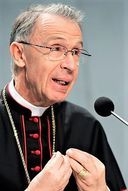
Commentary on Cardinal Ladaria' letter to the president of the US bishops' conference
Limited extract from Michael Sean Winters. subscription journal La Croix International, 13 May 2021
Cardinal Luis Ladaria, the prefect of the Congregation for the Doctrine of the Faith, wrote a letter to the president of the U.S. bishops' conference, Los Angeles Archbishop José Gomez, regarding the conference's plans to draft a policy on the worthiness of pro-choice politicians to receive Communion. In it, the Vatican doctrinal chief gave a tutorial in what it means to be a bishop, a lesson that is sadly as necessary as it is embarrassing for the U.S. bishops. Not only did Ladaria effectively derail those plans, he diplomatically asked, "What the hell are you thinking?" He is at pains to remind them how bishops should conduct themselves. The letter systematically pulls apart the rhetorical building blocks that had been assembled by the advocates of denying Communion to President Joe Biden. Kansas City, Kansas Archbishop Joseph Naumann, chair of the bishops' Pro-Life Committee, in various interviews; San Francisco Archbishop Salvatore Cordileone in his pastoral letter; and former Philadelphia Archbishop Charles Chaput in his article at First Things have so thoroughly conflated their identity as Catholics with the pro-life political movement, that they had confusedly thought it was fine to assemble political talking points and strategies, and then wiggle them into some kind of magisterial teaching. Ladaria's letter is one, long, systematic "Basta!".......(source). Photo:Cardinal Luis Ladaria Ferrer, Wikipedia,
Extract from Dennis Sadowski, CNS, National Catholic Reporter, 12 May 2021
Catholic proponents of nuclear disarmament joined scientists in calling on President Joe Biden to pursue an ambitious plan to end the threat nuclear weapons pose to the planet. In a statement to the White House May 12, a group of 14 disarmament advocates — seven Catholics, including three bishops, and seven scientists — urged Biden to seek a new agreement with Russia to continue reducing nuclear weapon stockpiles and work worldwide to achieve their abolition. "We are scientists committed to protecting health and safety and Catholic leaders committed to the common good of all people," the statement begins. "We are uniting in calling on President Biden to reduce the nuclear threat as our nation works with others for a world without nuclear weapons." Susan Gunn, director of the Maryknoll Office for Global Concerns in Washington, was one of the Catholics who signed the statement. She said it is time for the United States to move "from a culture of fear, a culture of death to a real, just and lasting peace that is life affirming." "I'm glad to say we see the Biden administration as a new beginning, a chance to recommit, to refocus on nuclear disarmament," she told Catholic News Service. The Union of Concerned Scientists' Global Security Program and Stephen Colecchi, former director of the U.S. Conference of Catholic Bishops' Office of International Justice and Peace, collaborated on developing the statement. It was released as reports have circulated that Biden and Russian President Vladimir Putin are seeking a summit in June, when Biden travels to Europe to meet with allies......(MORE). Photo: Biden CNS Reuters Kevin Lamarque, NCR 20210512
Extract from Catholic News Agency, 11 May 2021
The Vatican has told the bishops of England and Wales that it is amending the Code of Canon Law so that “crimes against minors are considered under a different title than crimes against the obligations of celibacy on the part of clerics.” The Pontifical Council for Legislative Texts shared the information in a letter dated April 19, responding to the English and Welsh bishops’ request for adjustments to canon law concerning clerical sexual abuse. In the letter, addressed to bishops’ conference president Cardinal Vincent Nichols, it said: “After review of the information and recommendation Your Eminence submitted to this Pontifical Council, I am pleased to inform you that the concerns you have expressed have already been taken into consideration in the revision of Book VI of the 1983 CIC [Code of Canon Law], which is currently in process.” “In the revised Book VI of the 1983 CIC, crimes against minors are considered under a different title than crimes against the obligations of celibacy on the part of clerics. The revised title will be ‘Crimes against the life, dignity and freedom of man’ and will include a canon that is specific to crimes against minors.”....(More).

Archbishop Mark Coleridge says days of the autocratic, monarchical Church "are over"; expresses confidence in German synodal path, saying talk of schism is "ridiculous".
Limited extracts from Robert Mickens, Letter from Rome, Subscription journal La Croix International, 7 May 2021
Pope Francis has no one in his small circle of advisors, known as the Council of Cardinals, who is from Oceania. While the other continents have a seat in the seven-member "kitchen cabinet" or C7, Oceania's chair has been empty since October 2018. That's when the pope thanked Australian Cardinal George Pell for his services and removed him from the group. There are three cardinals from Oceania who are all still under the age of 80 that could have easily taken the place of Pell -- John Dew of New Zealand, John Ribat of Papua New Guinea and Soane Patita Mafi of Tonga. But Francis did not choose any of them. And in the two consistories since Pell's vacancy, the pope did not make any new cardinals in Oceania. "Flashes of Insight" It's too bad the red hat is a requirement to fill Pell's slot. Because if it weren't, the pope couldn't do any better than to choose Archbishop Mark Coleridge of Brisbane. The 72-year-old Melbourne native and scripture scholar is probably the brightest bishop in all of Oceania. Currently the president of the Australian Bishops' Conference, he is one of the major figures involved in preparing his country's Plenary Council. Coleridge recently joined Cardinal Dew and British theologian Thomas O'Loughlin -- whom readers will recognize as a regular contributor to La Croix International -- for an engaging and informative video discussion on synodality in the Church. The online conversation was moderated by another LCI contributor, Joe Grayland, a presbyter and liturgist in Dew's native New Zealand. It's part of a new series called, "Flashes of Insight: Topical conversations about and of interest to the Catholic Church." All four of these priests offered more than just "flashes" of insight regarding synodality. They also raised important questions about this new and not always clear path the Jesuit pope has pushed the Church to embark upon...........An articulate voice for synodality Mark Coleridge's comments were particularly interesting and served as reminder why he has emerged, perhaps surprisingly to some who have known him for a long time, as one of the bishops who has embraced and has best articulated the pope's hopes of a synodal Church. He acknowledged that synodality is messy, is marked by tensions and requires "holy patience". But he said he was absolutely convinced that this "is the way forward... is what the Spirit is saying to the Church today"...........(Source). Photo: Synodality video Coleridge Dew La Croix Int 20210507
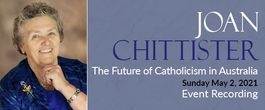
Convocation of Catholics - Video
Sr. Joan Chittister OSB
Friday 7 May 2021
Extract from Conclusion, Wijngaards Institute, Linked here 7 May 2021
.....There are no grounds, either from the sciences or from the Bible, to support current Catholic teaching that each and every act of sexual intercourse has a procreative sig-nificance and finality, and that consequently same-sex acts are “intrinsically disor-dered” because they lack a procreative significance and finality. The criteria for morally evaluating same-sex re-lationships and sexual acts should be the same as those used for morally evaluating heterosexual rela-tionships and sexual acts.Homosexual relationships can be as life-giv-ing and blessed as their heterosexual counter-parts. They can fulfil one or more of human sex-uality’s non-conceptive meanings, including pleasure, love, com fort, celebration, friendship, and companionship........Document HERE
Limited extract from Claire Giangravé - Religion News Service, Subscription Journal America Magazine, The Jesuit Review.May 06, 2021
VATICAN CITY (RNS) — As some American bishops discuss the possibility of denying Communion to Catholic politicians such as President Joe Biden for supporting abortion-rights policies, a senior Vatican prelate said decisions about administering the sacrament rest solely on the bishop giving the Eucharist. “It’s not up to bishops in general to make these decisions, it’s the bishop of the person,” said Cardinal Michael Czerny, the undersecretary of the Migrants and Refugees Section of the Vatican’s Dicastery for Promoting Integral Human Development, in an interview with Religion News Service on Thursday (May 6). Bishops in the U.S. are scheduled to vote whether to commission a document on the question of Communion during their annual meeting in June, after conservative bishops such as Archbishop Salvatore Cordileone of San Francisco recently argued that elected officials should be barred from receiving the Eucharist for their views on abortion.....source.
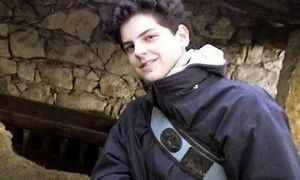
People around the world wished Blessed Carlo Acutis a happy 30th birthday on social media.
Extract from La Croix International, 6 May 2021
Just 30 years after his birth, Blessed Carlo Acutis appears to be attracting more people than any of the modern-day saints did when they turned the same age. Catholic parishes across Acutis' native Italy and the faithful from as far away as the Philippines celebrated the May 3rd birthday of the "cyber-apostle of the Eucharist", who was only 15 years old when he died of leukemia. Young people around the world took to Facebook to offer birthday wishes in a collaborative video message, started by the Friends of Carlo Acutis Association. "Ciao, Carlo, I wish you a very happy birthday. I am grateful from my heart for how you helped me to find the salvation of my life and my faith," a girl said in the video message, Catholic News Agency reported. In a message for the 25th National Pilgrimage of the altar servers of Portugal, Pope Francis urged the youths to heed these words of the Blessed Carlo: "All are born as originals, but many die as photocopies." The southern Italian diocese of Cassano all'Jonio has started a "Eucharistic Week with Blessed Carlo Acutis" and churches in various parts of Italy are planning to hold month-long prayer meetings under his patronage. A new Catholic youth center named after Blessed Acutis was opened in Palmi in Reggio Calabria province. An oratory with a soccer field was inaugurated by Bishop Francesco Milito of Oppido Mamertina-Palmi. Parishes in Naples, Salerno, Ferentino, Foggia, Salerno and other parts of Italy also held prayer meetings with relics of Carlo Acutis. There were also votive Masses, Eucharistic adoration and the public recitation of the rosary.....(source). Photo: Carlo Acutis Blessed, YouTube, La Croix International 20210504
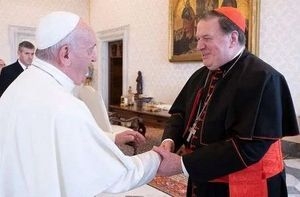
Cardinal Joe Tobin says many are uncomfortable with the pope's shift in priorities, but he predicts the changes are here to stay.
Limited extract from By Christopher White, Subscription journal La Croix International, 6 May 2021
Church leaders, including those in the United States, uncomfortable with Pope Francis' emphasis on mercy and an attentiveness to the voices of those on the peripheries should reexamine their skepticism, according to Cardinal Joseph Tobin of Newark, New Jersey, who says such priorities are here to stay. "The election of Pope Francis opened up the rest of the world to the rich theological foment of the church in Latin America, with its strong sense of mission, encounter, the peripheries and mercy," said Tobin. "Many, including church leaders in this country, have found that shift to be uncomfortable." The New Jersey cardinal's remarks came during a webinar on "Synodality and the Long Game of Pope Francis," delivered May 4 for Loyola University Chicago's Hank Center for the Catholic Intellectual Heritage annual Cardinal Bernardin Common Cause lecture. Francis' priorities, said Tobin, are "not going away anytime soon." He went on to quote Pope John XXIII's opening address to the Second Vatican Council that "Christ prefers to make use of the medicine of mercy rather than of severity." Tobin identified Francis' focus on synodality as the vehicle by which Francis hopes to usher in this new focus on the need for mercy and listening to a range of voices for the church, saying that it is a "model of the church that the Lord expects for us in this millennia" and one that "will require changes on how we do and are church." Drawing on his own experience of participating in five synods in his capacity as former superior general of the Congregation of the Most Holy Redeemer — three under Pope John Paul II and two under Pope Benedict XVI — Tobin said that Francis is "tuning up an engine" of the Synod of Bishops, a body first initiated by Pope Paul VI. Synodality, the cardinal observed, is an often misunderstood "buzzword of this papacy." Tobin said that such a course must be guided by a church willing to journey together, recognizing the importance of conversion and the role that mercy plays in that process. Tobin addressed criticisms of the synod process, such as those that have said it lacks or direction or "seeks to accompany, but not convert." "A movement from severity to mercy is already quite a conversion," he countered. "Conversion requires going out." The body of Christ, he went on to argue, must "go out" to the world around it. "What do healthy bodies do?" he asked. "They move."....(source). Photo: Pope Francis Cardinal Joseph Congregation for Bishops CNSVatican Media. La Croix Ont 20210506
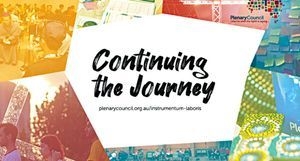
Extract from Jenni Brinkworth, The Southern Cross, Adelaide Archdiocese, 5 May 2021
All parishes and migrant communities will have an opportunity to contribute to the Assembly in the preparation phase. A video is being produced for screening at Masses as the basis for feedback that will be collated and discussed at the Assembly. “This is not just something where we’re looking inwardly, we’re trying to look outwardly…as missionary disciples,” he says. “And we all have a part to play in that. Together we can make a difference.” The Assembly will commence on Friday evening, September 17, and continue on Saturday September 18 at Cabra College, Cumberland Park. The Adelaide Archdiocese will join with the Diocese of Port Pirie and the Diocese of Darwin to form a province hub for the Plenary Council from October 3 to 10. Plenary delegates from the three dioceses will meet in person and link up with delegates from other hubs around the country via a live video link. About 400 people are expected to attend a Diocesan Assembly in September to reflect on the life of the local Church community, in conjunction with ongoing discernment for the Plenary Council taking place at a national level in October.....(more)

Edited Extract from Fr Bruce Duncan CSsR, CathNews, 30 April 2021
Pope Leo XIII’s 1891 encyclical Rerum Novarum marked the birth of modern Catholic Social Teaching and has continuing relevance today, according to Yarra Theological College’s Fr Bruce Duncan CSsR. Source: Australian Cardijn Institute. This year is the 130th anniversary of Rerum Novarum, the English title of which was “On the Condition of the Working Classes”. “Faced with our gig economy, low or stagnant wages, housing stress, astonishing wealth in the hands of a few and neoliberal economics driving growing inequality, Pope Leo XIII’s 1891 encyclical, known in Latin as Rerum Novarum, is acutely relevant today,” Fr Duncan said. “It has guided Catholic social teaching ever since.” Key teachings of the encyclical include: the dignity of every person and of work in God’s eyes; defending the right to private property when serving the common good; opposing the concentration of great wealth in the hands of a few; maintaining just wages for working people; spreading ownership more equitably and as much as possible; the duty of the State to regulate living and working conditions fairly; the need for systems of arbitration and conciliation to mediate disputes; the right of working people to form unions to bargain equitably with employers; and the duties of the rich to deal justly and redistribute surplus wealth. To mark the anniversary, Yarra Theological Union, Social Policy Connections and the Australian Cardijn Institute will host a webinar on Saturday, May 15, from 2.30-4 pm. More + Webinar Details HERE. Photo: Pope Leo XIII, wikipedia, CathNews, 30 April 2021
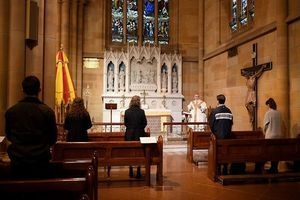
Extract from Joan Chittister, National Catholic Reporter, 29 Apr 2021
Over the years, we have begun to discover some differences between Jesus and the church: Jesus has credibility. The reputation of the church, on the other hand, teeters. The papacy, the very cornerstone of the church, is a little-known history because so many of the early popes themselves were morally decrepit. The institution itself has wavered between the preservation of the faith and the amassing of power. The call of the church to protect the faith deteriorated into the Crusades rather than into universal unity. Evangelization became more a game of denominational competition than wholesale welcome of the ecumenical others. Until finally, the renewal of the church has been swamped in regalia, clericalism and wealth. The eminence of the church has become more architectural, more institutional than ringingly, obviously, universally compassionate. At least not as the divorced Catholic saw it then. Not as the Catholic in a mixed marriage saw it. Not as the beaten women they were telling to be more obedient to their husbands saw it. And certainly not as LGBT persons seeking real love and the sacraments they need to maintain them even now. Yet, it is also the church that saved itself over and over again. The church recoiled from nepotism — the control of the church by family dynasties. The church faced a long, long struggle to do it but managed finally to free itself from secular power in a monarchial world that had come to engulf it in simony and the selling of positions, pastorates and religious hucksterism. Even more, the church pursued idea development well beyond the errant levels of piety gone astray or magic confused with sacramentalism. The church triumphant educated generations of the faithful who sought to lead both a spiritual life and a humanly fulfilled life. And, from age to age, the church gave the world models of sanctity that kept Jesus alive in our midst. It is that church that has repented its sins over the centuries and converted itself from age to age. But now we are back to that very point: The church is again in need of reform and repentance, of growth and grace. It is being called in this era to embrace the whole church rather than simply a segment of it. The implication of that is that the church, too, as well as society, must move beyond clericalism, sexism and institutionalism, not to mention the emphasis on organization often at the expense of the people who identify and depend on it. Given those concerns and real openness to a new kind of inclusion, it appears that the church may well be on the verge of becoming church rather than institution. Maybe. Cue emphasis on synodality here.....(more) Photo: Mass St Mary's Cathedral Sydney during COVID-19 pandemic CNS Dan Himbrechts, AAP Image via Reuters NCR 20210429

Extract from CathNews, 29 April 2021
Women members of the Plenary Council will today have an opportunity to meet and connect with each other in an event organised by Women and the Australian Church, in partnership with Australian Catholic University and Catholic Religious Australia. WATAC president Andrea Dean said less than a third of Plenary Council members are women. “As many of the women are from a range of backgrounds and locations, many will have had little opportunity to connect with each other and share their ideas as women,” Ms Dean said. CRA executive director Anne Walker said today’s event at ACU’s North Sydney campus would encourage “women members of the Plenary Council to explore and discuss issues that are relevant and important within the Church. “These women have a diverse range of perspectives, and lived experiences of being a Catholic woman in the Church today,” Ms Walker said. “I expect a variety of reflections on the question ‘What do you think God is asking of us in Australia at this time?’ The collective intelligence and wisdom of these women are gifts to the Church. Together, this event aims to provide a space that will be open and respectful to allow for frank and courageous conversation.”....(more). Photo: Anne Walker collective intelligence wisdom women gifts to Church Bigstock CathNews 20210429

Extract from CathNews, CNA. 29 April 2021
Cardinal George Pell says the situation of the Church in Germany appears “ominous”, underlining that the German bishops must fulfil their duty to uphold the teachings of Scripture. “I think that there is a percentage of the German Church that seems to be resolutely heading in the wrong direction,” Pell said in an interview with Colm Flynn that aired on EWTN yesterday. “By that, I mean it is quite clear that a liberalised Christianity, whether it is a liberalised Catholicism or Protestantism, in a generation or so merges into agnosticism … If you adopt the policies of the world and just go along so that they approve, nobody is going to be interested in that.” Cardinal Pell’s comments come as members of the Church in Germany are planning on May 10 to hold a day of blessings for same-sex partners, despite the Vatican Congregation for the Doctrine of the Faith’s declaration that the Church does not have the power to bless same-sex unions. Cardinal Pell said: “The duty of the German bishops is to uphold the teachings of Scripture, to uphold the teachings of the Church. We stand under those teachings. They’ve got no power to change them – none of us do.” The cardinal added that all leaders in the Church must decide whether or not to speak up about Church teachings at times when that message may be unpopular. “You have all sorts of voices who are trying to crowd us out of the public square and saying we shouldn’t be doing this and that. Well, one of the things I am saying now and to all my successors is: We just have to keep talking,” he said.....(More). Photo: Cardinal George Pell CNA Daniel Ibanez CathNews 20210429
Extract from CathNews NZ Thursday, April 29th, 2021
The government is seeking to tighten controls on the Royal Commission into Abuse in Care. Besides insisting on a firm 2023 deadline to wind up the investigation, the government has told the Abuse in Care Commission that they may not investigate modern care providers and post-1999 cases of abuse. In addition, the Commission’s budget blow out has led the government to rope in the Treasury to look at the Royal Commission’s spending and to improve its financial management. The Royal Commission is examining abuse that occurred in state and faith-based care between 1950 and 1999. When it was established in 2018, it was given the discretion to look outside of that time period. Minister of Internal Affairs Jan Tinetti (pictured) removed this power to ensure the work is completed by 2023.....(more)

Extract from David Crary - Associated Press, America, The Jesuit Review, 28 April 2021
When U.S. Catholic bishops hold their next national meeting in June, they’ll be deciding whether to send a tougher-than-ever message to President Joe Biden and other Catholic politicians: Don’t receive Communion if you persist in public advocacy of abortion rights. At issue is a document that will be prepared for the U.S. Conference of Catholic Bishops by its Committee on Doctrine, with the aim of clarifying the church’s stance on an issue that has repeatedly vexed the bishops in recent decades. It’s taken on new urgency now, in the eyes of many bishops, because Biden — only the second Catholic president — is the first to hold that office while espousing clear-cut support for abortion rights. Such a stance, by a public figure, is “a grave moral evil,” according to Archbishop Joseph Naumann of Kansas City, Kansas, who chairs the USCCB’s Committee on Pro-Life Activities and believes it’s necessary to publicly rebuke Biden on the issue. “Because President Biden is Catholic, it presents a unique problem for us,” Naumann told The Associated Press. “It can create confusion. ... How can he say he’s a devout Catholic and he’s doing these things that are contrary to the church’s teaching?” The document, if approved, would make clear the USCCB’s view that Biden and other Catholic public figures with similar viewpoints should not present themselves for Communion, Naumann said. In accordance with existing USCCB policy, it would still leave decisions on withholding Communion up to individual bishops. In Biden’s case, the top prelates of the jurisdictions where he frequently worships — Bishop W. Francis Malooly of Wilmington, Delaware, and Cardinal Wilton Gregory of Washington, D.C. — have made clear that Biden is welcome to receive Communion at churches they oversee. The document-in-the-works results from a decision in November by the USCCB’s president, Archbishop José Gomez of Los Angeles, to form a working group to address the “complex and difficult situation” posed by Biden’s stances on abortion and other issues that differ from official church teaching.....(more). Photo: Joe Biden, Jill Biden Mass Cathedral St. Matthew the Apostle Washington AP Evan Vucci America Magazine The Jes Rev, 28 April 2021
Synodality and papal primacy
Questions regarding the Catholic Church today and the next pope.
Limited extract from Massimo Faggioli, subscription journal La Croix International, 20210427
"There's a short path that is long, and a long path that is short". In
the third seasons of the Netflix series Shtisel, an eminent
ultra-Orthodox rabbi who heads a yeshiva in Jerusalem offers that bit of
sage advice to a star student who is dealing with a life-and-death
decision. Short paths tend to become shortcuts leading nowhere, while wisdom suggests taking time to make a decision. "A
long path that is short" is indeed a good way to explain the virtue of
synodality, the biggest wager Pope Francis has made for the Catholic
Church today. Five and half years
after he delivered what can be called his magna carta on synodality to
the 2015 assembly of the Synod of Bishops, the pope's persistent push in
favor of a synodal Church is having effects. In different areas of the Catholic world, there are ecclesial events of a synodal nature unfolding or being prepared. A
synodal movement that requires time and presence: There is Australia's
historic Plenary Council, which will hold its first meeting in October.
And there is the "synodal path" already underway in Germany. Preparations
are currently being made for a national synod in Ireland and, after
much insistence from the pope, the Church in Italy is finally beginning
plans for its own synod. The editors
of the Jesuit-run magazine, America, have just argued for plenary
council for the Catholic Church in the United States. At the
supra-national level, the Latin American bishops have launched their own
ecclesial assembly, the first-ever "Ecclesial Assembly of Latin America
and the Caribbean". This synodal
movement is unfolding at a time of great uncertainty due to the
coronavirus pandemic. Synodality, which means the people of the Church
"walking together", requires gathering together in assemblies. Some
of these assemblies (e.g. in Germany and Australia) have been delayed
or postponed, and the same is likely to happen again in other
places. And it's possible the next
ordinary assembly of the Synod of Bishops -- which is scheduled for
October 2022 and based on the theme --"For a synodal Church: communion,
participation, and mission" could also be delayed.....(Source)

Extract from American Magazine/Faith, 22 April 2021
When Father John Wester received a call just before 8 a.m. Mass, he had no idea it would be the nuncio, the pope’s ambassador, phoning to tell him he would be the next auxiliary bishop of San Francisco. “I think my knees were knocking,” now-Archbishop Wester of Santa Fe, N.M., told America’s “Inside the Vatican” podcast. The bishop said his parishioners told him, “‘You don’t look very good, Father!’ and I said, ‘Well, I don’t feel very good right now!’ It was kind of a shockeroo.” Archbishop Wester’s story is not unusual. Most bishops are appointed without ever knowing they were being considered for the job and are caught by surprise when chosen. The bishop selection process is perhaps the most secretive hiring process in the world, shielded from both the candidate and the priests and people he will serve. Those who are consulted about possible candidates are required to return the list of questions they’ve been sent, because even the questions, which reveal no particulars about a candidate, are protected under the Vatican’s top confidentiality classification: the “pontifical secret.” There is a joke among the hierarchy that “a pontifical secret is a secret you don’t tell the pope,” but the secrecy around this process has been chipped away in recent years. On this episode of "Inside the Vatican," working from a copy of the revised survey that he obtained, America's Vatican correspondent Gerard O'Connell summarizes some of the questions that the Vatican is now asking about possible bishops.....(more). Photo: Cardinal Marc Ouellet, Vatican Conference on the theology of the priesthood, CNS photo Paul Haring, American Magazine 20210422
Extract from J.A. Dick, Pearls & Irritations, 22 April 2021
A Gallup poll released on Monday, March 29 , 2021, indicates that the proportion of Americans who consider themselves members of a church or synagogue has now dropped below 50%. The results highlight a dramatic shift away from religious affiliation in recent years, and among all age groups. When Gallup first asked the question in 1937, church membership was 73%. Organized religion in the USA is clearly in recession. In the case of Judaism, the indicators include declining synagogue membership, a general disinterest in traditional religious practice and belief, and decreased belief in God. In USA Islam, by the way, a substantial share of adults who were raised Muslim no longer identify as members of that religious tradition. Unlike some other religions in the United States, however, Islam gains about as many members as it loses, due primarily to immigration. In terms of US church membership, Protestants show a 9% decline from 73% to 64%. Catholics, however, have the greatest decline with 58% indicating church membership, which is down 18 points from 76% in a previous Gallup survey from 1998-2000. Already in 2015 a Pew Research report noted that nearly 13 percent of all Americans are former Catholics. US Catholicism is a divided house, as we have seen in recent Catholic support and Catholic opposition to the second US Catholic president: President Joseph Biden. The contemporary Catholic reality is that most American Catholics, today, do not agree with official Catholic teachings about key moral issues. That official teaching still stresses that artificial contraception, homosexuality, and abortion are “intrinsically evil.” Nevertheless, more than half of today’s US Catholics, 56% as of September 2020, said abortion should be legal in all or most cases. More than 82% say birth control is morally acceptable; and 61% said in a 2019 survey that they favor allowing gays and lesbians to marry. Same-sex marriage of course became legal across the United States following a Supreme Court ruling in 2015. Most of today’s American Catholic bishops were not educated and shaped by the pastoral focus of the Second Vatican Council (1962-1965) but by the rigid dogmatism of Popes John Paul II and Benedict XVI. For them obeying institutional directives comes first and they tend to be right of center or very far right. Many strongly supported the former US president, Donald Trump. Most are not positively influenced by the opinions and beliefs of today’s US Catholic laity; and are busily closing and consolidating parishes, closing schools, and worrying about bankrupsies.....(more)
Extract from Catholic Outlook, Parramatta Diocese, America Magazine, 23 April 2021
You might have seen Nancy Murray, O.P., in a different role in the not-so-distant past. Before COVID-19 put the kibosh on such things as performing before live audiences, she made a ministry out of appearing as St. Catherine of Siena or the martyred Notre Dame de Namur Sister Dorothy Stang or Mary Potter, founder of the Sisters of the Little Company of Mary. This month in McAllen, Texas, she is assuming a new role, helping families coming across the border transition to life in the United States, answering a call for help from Catholic Charities USA offices all along the Southwest border. Sister Murray, whose brother Bill has had some acting success of his own, said that with her usual work on standby, it was “a good time” to answer a call for assistance issued on behalf of Catholic Charities by the Leadership Conference of Women Religious. “And I wanted to be working with the families,” she added. After being detained across the border for months, thousands of asylum seekers have been allowed passage into the United States after President Joe Biden suspended the Trump administration’s “Remain in Mexico” plan. That policy stranded hundreds of families and thousands of individuals in gruelling conditions in makeshift camps along the border....(more)

Extract from Christopher Lamb, The Tablet 27 March 2021, Republihed in Cath News NZ 22 April 2021
Embracing a synodal model of the Church is “messy” but it offers the only path to a “future that’s worth having”, says a leading Australian bishop. Archbishop Mark Coleridge of Brisbane, the president of the Australian Bishops’ Conference, was speaking about the experience of the plenary council, the highest form of gathering for a local church, and one of the leading examples of “synodality” in global Catholicism. Synodality, a concept which Pope Francis wants to see implemented from the parish upwards, brings people, priests and bishops together to make decisions about the future of the church. “I think we are learning that the whole process is very slow and very messy. Autocracy was always quicker and cleaner,” Archbishop Coleridge told a webinar organised by The Tablet. “But if you are serious, and we are, about listening to the voice of the Holy Spirit, who is the only one who does know where are going, then it is slow and it is messy trying to hear the voice of the spirit in the vast cacophony or polyphony of the Church.” He went on: “It’s the only way into the future that’s worth having or a future that God might have in mind for us.” The Australian church’s decision to convene a council was sparked by the clerical sexual abuse scandals and the findings of a Royal Commission which exposed the Church’s institutional failings. Archbishop Coleridge stressed reform is needed in the Church because “the current mode of leadership is unsustainable”. He was joined in the discussion by Archbishop Timothy Costelloe of Perth, the president of the plenary council.....(more). Photo: Mark Coleridge Abp Remo Casilli Reuters, The Tablet 26 March 2021

Extract from National Catholic Reporter, Catholic News Service, 19 April 2021
COLOGNE, Germany — Catholic laypeople in the Archdiocese of Cologne have called for a local synod to address the ongoing crisis in Germany's most populous diocese. "We must make every effort to reestablish a genuine dialogue between the cardinal, senior members of the diocesan leadership and the grassroots of the church," said Tim O. Kurzbach, president of the Cologne archdiocesan council of Catholics. On March 18, the law firm Gercke Wollschläger released a report on how clergy sexual abuse was handled in the archdiocese. The report showed that in 24 of 236 files studied, an investigation found 75 breaches of duty by eight officials, including archbishops, vicars general and personnel managers. Among those accused of such breaches were Hamburg Archbishop Stefan Hesse and Cologne Auxiliary Bishop Dominik Schwaderlapp, as well as two former archbishops of Cologne, now deceased: Cardinals Joachim Meisner and Joseph Höffner. Pope Francis has granted Hesse, former personnel director in Cologne, a leave of absence from his duties as archbishop of Hamburg. Schwaderlapp has been suspended from his duties until further notice and has offered his resignation to Francis. Cardinal Rainer Maria Woelki was not incriminated, but later said, "It's not just about doing the right thing, it's about doing everything humanly possible. And I didn't do that." The German Catholic news agency KNA reports the archdiocesan council — which represents laypeople — said it hoped a synod would lead to improved communication and "a new beginning based on sincerity and honesty." The synod must create a binding framework for the future and address the systemic causes of sexual abuse, Kurzbach said. He added that it should be led jointly by the diocesan leadership and laypeople; everyone involved in the church should be able to participate.....(more). Photo: Cologne cathedral NCR, CNS KNA Harald Oppitz, 19 April 2021

Extract from CathNews, CNS, KNA, 16 April 2021
Germany is considering replacing state payments to Catholic and Lutheran churches, which received combined benefits of more than $US650 million in 2020. At a hearing in the interior affairs committee of the Bundestag, or lower house of Parliament, they welcomed in principle the intention of legislation by the opposition liberal Free Democratic Party, the Greens and the Left Party and pointed out that it was in line with a constitutional mandate to abolish the payments, which date back to a 19th-century provision. By contrast, a number of legal experts said an alternative bill by the Alternative for Germany party to simply phase out the benefits was unconstitutional, reported the German Catholic news agency KNA. The bill by the three parties aims to create the necessary framework for agreements between the federal states, which currently make the payments, and the Catholic dioceses and Protestant regional churches. Most of the state payments date back to 1803, when German imperial princes received expropriated church property as compensation for a loss of territory. In return, the princes paid the churches money on a regular basis. The right of the churches to levy contributions, or a church tax, from their members has nothing to do with these state benefits, KNA reported. Since 1919, the constitution has called for these benefits to be replaced. The prerequisite for this would be agreements with the churches at the federal and state level as well as corresponding laws......(more) Photo: German churches levy tax members phasing out state benefits CNS Harald Oppitz KNA CathNews 20210416

Extract from CathNews NZ, 15 April 2021
The Catholic Church has built a mosque for internally displaced Muslims at a camp in Yola, northeastern Nigeria. The Bishop of Yola’s Catholic Diocese, Stephen Mamza, says since 2014 the Diocese has helped care for the displaced victims of Boko Haram insurgency who ran to Yola for refuge. Mamza says Church authorities didn’t ask what religion or denomination the people were when they sought refuge at St Teresa’s Cathedral. Up to 3,000 people have lived on the Church premises since then, although most have now returned to their original homes. There are others who are still at the camp, however, because of continuing threats from Boko Haram. The mosque, along with a new church and school, has been incorporated into a housing estate for the 86 families still at the camp. Mamza says there are about 10 to 12 Muslim families in the camp. He says it seems to him that if houses are provided for everyone, along with a church for the Christians, that they also provide a space of worship for the internally displaced Muslims. The means to build the mosque came through the support of Missio in Germany, Mamza says......(More). Photo:Gov-Fintiri-Commissions-Housing-Built-By-Catholic-Diocese-CathNewsNZ, 15 April 2021
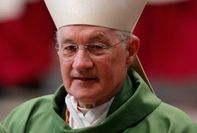
Extract from Elise Ann Allen, senior correspondent, Crux, 13 April 2021
ROME – A top Vatican official in charge of organizing a major symposium on the priesthood next year has said the discussion will touch on several controversial hot-button issues such as priestly celibacy, the women’s diaconate, clericalism, and the clerical sexual abuse crisis. Speaking to journalists during the April 12 presentation of the event, Canadian Cardinal Marc Ouellet said, “the question of celibacy is important.” “We have all spoken about it, and it will be discussed, but it will not be the central theme of the symposium,” he said. “It is not a symposium on celibacy, like it needs to be taken up deeply. It’s a broader perspective.” Head of the Vatican’s Congregation for Bishops, which is helping to organize the symposium, Ouellet when asked whether other hot-button issues such as the priestly ordination of viri probati, or “tested” married men, and the women’s diaconate would be addressed, said yes. “I can say that certainly none of these points will be ignored in the sense they are part of the current context of the question of the priesthood,” he said, but reiterated his insistence that these will not be the main topics of discussion. Issues such as priestly celibacy, the ordination of viri probati, and the women’s diaconate have all been major sources of discussion and controversy in recent years, specifically during the 2019 Synod of Bishops on the Amazon, during which proposals were made by several bishops to green-light viri probati ordinations as a solution to a regional priest shortage and to allow women deacons.....(more). Photo: Cardinal Marc Ouellet Congregation for Bishops Paul Haring CNS Crux 20210413

Extract from Gail Freyne, Pearls & Irritations, John Menadue's Public Policy Journal, 13 April 2021
My text for today is taken from the Book of Genesis, as translated by John Milton: “Hee for God only. Shee for God in him.”Paradise Lost, 1667. Eve was something of an afterthought. She was not a necessary part of the original creation story until Adam requested her. God complied and uses Adam’s flesh to form her. Throughout the story, Eve faces misogyny from Satan, from Raphael, from Adam and even from God. Was Eve fully human at all? Throughout the history of western thought the work of philosophers can be distilled to two questions asked by all of them, in one form or another: What does it mean to be a human being? And, What is the best way for us to live together? Sad to report, Catholic teaching, even to this day, repeatedly comes up with the wrong answer to the first question, even in the face of verifiable facts. First, slightly more than half of the human population is female. Second, we are all born naturally equal. Third, the second Vatican Council pronounced the equality of all Christians through baptism. Yet, in the face of these facts, the Church sets about espousing a theory that renders the sexes unequal. They do this by insisting on a theoretical position that confuses sex and gender. This obfuscation of observable facts is accomplished by laying gender theory on the sexed reality of our bodies, producing the socially constructed categories of masculine and feminine. This gender theory they call complementarity. The constant repetition of this theory results in a dual anthropology that deforms both sexes.....(more) Image: Gail Freyne
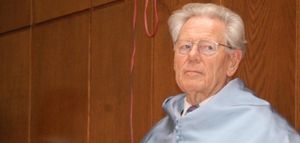
Homily for the Second Sunday of Easter
Readings: Acts 4:32-35; 1 John 5:1-6; John 20:19-31
Extract from Fr Frank Brennan SJ, Catholic Outlook, 11 April 2021
Neither you nor I has ever seen the risen Jesus. Nor have we ever had the option like Thomas of putting our hands into his side or putting our finger into the holes which the nails had made. Neither you nor I will ever have the experience of those disciples in the closed room seeing the risen Jesus and then being filled with joy. Nor will we ever have the experience of Mary who stood outside the tomb able to cling to the risen Jesus. But in John’s gospel today, we are assured that sufficient signs have been recorded so that we too may believe that Jesus is the Christ, the son of God, and that believing this, we may have life through his name..........Like the disciples, each of us has our fears. Like the disciples, we often close ourselves in our rooms at a safe distance from the world. Like the disciples, we are consoled when we hear that message of Jesus: “Peace be with you”.......(more) Photo: Hans Kung UNED Universidad Nacional de Educación a Distancia, CatholicOPutlook, 11 April 2021
Francis calls for an overhaul of the World Bank and the International Monetary Fund so that they foster a "spirit of global solidarity"
Limited extract from Xavier Le Normand, subscription Journal La Croix International, 9 April 2021
Pope Francis has urged global finance leaders to ensure that COVID-19 recovery plans do not lead to "a return to an unequal and unsustainable model of economic and social life, where a tiny minority of the world's population owns half of its wealth". In a letter to the World Bank and the International Monetary Fund (IMF), which the Vatican made public on April 8, the pope pleads for "new, more inclusive and sustainable solutions to support the real economy". The pope's letter is actually dated April 4 and was delivered as the two financial organizations began an April 5-11 spring meeting. In the text, Francis says "new and creative forms of social, political and economic participation must be devised, sensitive to the voice of the poor and committed to including them in the building of our common future". Echoing his last encyclical, Fratelli tutti (2020), he calls for "a 'culture of encounter' in which every voice can be heard and all can thrive". The 84-year-old Argentine pope argues that it is indispensable to "create new or regenerate existing institutions" at the international level, in particular for "giving poorer and less developed nations an effective share in decision-making and facilitating access to the international market". He says that, in order for this to happen, the World Bank and the IMF must change the voting procedures in their organizations. Currently the largest contributors -- the United States, Japan, Germany, France and the United Kingdom -- have the preponderance of votes.....(source).

Extract from CathNews, CRA, 9 April 2021
Catholic Religious Australia has made a submission to the Indigenous voice co-design process, supporting the Uluru Statement from the Heart’s request for an Indigenous voice that is protected in the Australian Constitution. ”Whilst we understand that there are many voices and opinions across Aboriginal and Torres Strait Islander peoples, we support a constitutionally enshrined voice for Indigenous peoples,” CRA president Peter Carroll FMS said. “That voice will safeguard the right of self-determination and enhance the participation of Indigenous peoples in the democratic life of Australia.” In its submission, CRA urged the Morrison Government to select and implement proposed models of an Indigenous voice in full consultation with Aboriginal and Torres Strait Islander peoples, in the next stage of the co-design process.....(more) Image: Uluru Statement from the Heart, Uluru Statement website, CathNews 20210409

Theologian who officially translated Küng's writings into French says the recently deceased Swiss professor has left a powerful body of work that will endure
Limited extract from Jean-Louis Schlegel. subscription journal La Croix International, 8 April 2021
Hans Küng has long been known for his books and his controversies. There are links between the two, of course, but the "polemical books" should not overshadow the entirety of his oeuvre, as he proudly called his collective works. He has left a long and extremely impressive bibliography, which I believe will continue to be read into the future. I am thinking in particular of works such as Does God Exist? (Doubleday, New York 1980) and Christianity (CSM, London 1995). These are great panoramas that are stimulating and alert. They combine the history of ideas with ecclesial history and the history of Christianity, Yes, there were personal controversies, most notably involving John Paul II, the papacy, the Roman Curia and his criticism of "medieval" thinking within the Church. They will fade into the past, but the critical questions he raised will remain. Not long after the Second Vatican Council ended he -- as a Catholic! -- questioned a central dogma, papal infallibility, in Infallible? An Inquiry (Collins, London 1971). The dogma of infallibility remains, but there has been a latent suspicion of it ever since he published that book. His position on the issue and other criticisms led the Congregation for the Doctrine of the Faith to issue a "declaration" in 1979 saying he could "no longer be considered a Catholic theologian or function as such in a teaching role". With constant determination he opposed the interpretation of the Second Vatican Council that was put forth by John Paul II and Benedict XVI. He was especially opposed to Benedict's insistence that Vatican II had to be seen as being in continuity with the council that preceded it. Hans Küng never ceased to deplore the absence of all sorts of reforms that were intended by Vatican Council II.
He was a fierce supporter of Church reform, an attitude that was no doubt linked to his Swiss origins and the commitment to ecumenism he undertook early on in life. He was primarily interested in the question of truth and freedom in the Church. He raised the question of authority and power, and how it is shared and exercised within the institution.....(source). Photo: Hans Kung 2013, Photo Daniel Bockwoldt dpa picture-alliance MaxPPP La Croix Int 20210408

Extract from Andrew Hamilton, Eureka Street, 1 April 2021
In its Christian context, Easter Sunday celebrates the rising of Jesus to life. It follows his brutal execution on Good Friday after rigged trials. Good Friday this year occurs at the beginning of April, a month which Pope Francis dedicated to prayer for ‘those who risk their lives while fighting for fundamental rights under dictatorships, authoritarian regimes and even in democracies in crisis’. Such prayers have always been necessary. The sun will always rise on brave people as they wake ready to continue their struggle for justice, though wondering whether at the end of the day they will still be free and alive. Most live in towns and villages of which we have never heard, in nations about which our media report little. But sometimes we see the urgency of prayer written on the public images of people who have risked their lives. Movies have made us familiar with the faces of those who formed a chain, passing from one to another Jewish people in flight from Nazi extermination. The poems of writers who were killed or exiled to Siberia during the purges in Stalinist Russia evoke other images. We may also remember the faces of young students who offered flowers to soldiers during protests in Manila and Tienanmen Square. More recently we have seen the faces of students in Myanmar as they offered roses to the soldiers blocking their protest. Sadly these peaceful gestures have so often been rejected with implacable bloodshed and imprisonment. It is surely right for people who have seen their human rights violated and have suffered in defence of their families, friends and fellow citizens to be outraged by the savagery with which powerful, ambitious men with guns go successfully to war against their unarmed fellow citizens in order to protect their self-claimed entitlements. It would be hard not to nurture rage and hatred against the perpetrators. Good Friday properly belongs in that world of outrage at the violation of humanity. It does not move us away from horror and anger but invites a pause for close reflection on them.......(more). Image: image: Flickr
Extract from Inés San Martín, rome bureau chief, Crux, 1 April 2021
ROME – An estimated 100,000 Argentines sent messages to Pope Francis March 13, sharing their opinions regarding the first eight years of his pontificate, and he responded with a video made public Thursday, arguing that the Church is “never wrong” when listening to the “holy faithful people of God.” “In theological terms, they call it synodality,” Francis said. “It might have many names, but it’s the holy faithful people of God that carries the faith forward and in its own dialect.” But the pope didn’t only refer to the life of the Church in his five-minute video addressed to Father Jose Maria “Pepe” di Paola, a slum priest who collected over 100,000 messages from all over Argentina – from those who live in the shantytowns of Buenos Aires to politicians and everyone in between – lamenting that governments often don’t listen to the people. “We are used to many times making decisions without consulting the people,” Francis said in a video sent to Di Paola on Wednesday. Important decisions are taken without input at every level, he continued: “Whether for parish life, when the parish priest does not consult the people; be it in provincial life, when the governor does not consult the people; be it in the diocese, when the bishop does not consult the people; be it in the nation, when the authorities do not consult the people, even for important and disputed laws regarding morality.”........(more).
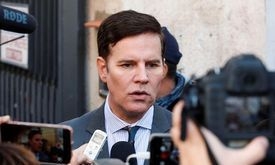
Extract from Christopher Lamb, The Tablet, 1 April 2021
In 2018, when the Pope visited Chile, he dismissed as “slander” the allegations of Juan Carlos Cruz that a bishop had covered up abuse by Fernando Karadima. Cruz and two others had bravely come forward with details of abuse perpetrated against them by Karadima, then a highly-respected and powerful priest. They had faced attacks, criticism and a refusal from the church hierarchy to believe them.
Following his Chile trip, Francis realised he had made a bad misjudgment, commissioned an investigation, and apologised to Cruz and the other survivors. Three years on, Cruz, an international advocate for survivors of clerical abuse, has been appointed by the Pope as a member of the Pontifical Commission for the Protection of Minors. It is quite a turnaround and comes seven years after two Chilean cardinals managed to block an earlier attempt to appoint him to the safeguarding advisory body. The reversal is also rooted in Francis' recognition that he must place victims, and their stories, at the centre of the Church’s response to abuse scandals. During the Chile debacle, the Pope invited Cruz and two other survivors to spend several days with him in the Casa Santa Marta sharing their stories. Soon after, the Pope held a summit with the Chilean bishops in Rome which led to the entire hierarchy offering their resignations over the scandal. “Never would I have imagined to have spoken to the Pope so freely, after all I went through,” Cruz told The Tablet. “In many ways, the bishops in Chile have been the Pope’s ‘crown of thorns’.” He said that in his new role “no one [can] silence me or buy me, or make it a PR effort. I will try to humbly help wherever I can.” While he trusts the Pope, the same cannot be said for some of the world's bishops. “Clericalism runs rampant in the church still,” he explains. “The Pope has done things to hold people accountable, but you run into brick walls.” ....(more). Photo: Juan Carlos Cruz, The Tablet, 1 April 2021
Extracts from CathNews, ACBC Media Blog, 1 April 2021
Almost 200 Catholic women from around the country gathered online on March 27 for a national consultation organised by the Bishops Commission for Evangelisation, Laity and Ministry. Twenty-six Australian dioceses were represented at the event, with Archbishop Christopher Prowse, the chair of the Bishops Commission, and Bishop Michael Morrissey, the Bishop Delegate for Women, also taking part. Bishop Morrissey said the discussions during the event will inform the development of the agenda for the “Catholic Women Gather” initiative planned for September 11. “Often we can look at the big picture of the Catholic Church in Australia and be disappointed about what does not seem to happen, yet so much is happening in the local communities of faith around the Church in Australia,” Bishop Morrissey said. “This clear message came to me listening to women’s stories from the many and varied communities around Australia. “I saw there was a respect shown for the divergent views expressed and shared deeply by many women during the two hours. That for me as a bishop was an enriching experience of simply listening without judgement to the many and varied voices.”........“Many women spoke of positive ways they are ministering in their local contexts, which was inspiring. However, others spoke of challenges, even despair at their local situation which has hindered their participation; this was disheartening to hear. “Both perspectives are the reality. I felt a sense of hope though – the voice of the Spirit – as we supported one another with our honest sharing.”....(more).
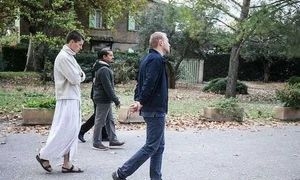
New national program of priestly formation focuses on maturity of candidates, adaptation of seminaries to current realities and the inclusion of more women on formation teams
Limited extract from Malo Tresca, subscription journal La Croix International, 24 March 2021
The Catholic bishops of France are set to vote this week on a new version of the Vatican's "program" (Ratio fundamentalis) for the formation of future priests -- something called the Ratio nationalis. The text, which has been three years in the making, was to be presented to the bishops on March 24 during their episcopal conference (CEF) plenary assembly and voted on two days later. Priestly formation is just one of five major issues on the agenda for the CEF spring plenary, which opened on March 23 with a one-and-a-half day session on integral ecology. The CEF drafting committee compiled the new Ratio nationalis after careful consultation with French seminary formators and rectors, a number of bishops and officials in Rome. It is to bring the national program for priestly formation in line with directives that the Vatican issued in December 2016. The French text, which may be modified following the upcoming vote, intends to introduce important developments in the preparation for priesthood. "Among the new features, the seminary will be open to ongoing formation throughout the duration of ministry," said Archbishop Jérôme Beau of Bourges, president of the Episcopal Commission for Ordained Ministries and Lay People with Ecclesial Missions...Source. Photo: Immaculate Conception seminary Toulon, CEMOLEME Etienne Garnier Presse Sports La Croix Int 20210314

Extract from CathNews, NZ Catholic, 24 March 2021
Cardinal John Dew told a royal commission of inquiry that the Church in New Zealand is ashamed and saddened that people suffered abuse while in its care. The cardinal spoke during opening statements by the Church at the second phase of the Royal Commission of Inquiry into Abuse in Care’s hearing on redress in Auckland on Monday. “Our hope is that this commission will lead us and help us to be a better Church – and that is a Church (in which) this disgrace of abuse will be addressed, will cease, and our Church will always be a Church that gives life and hope. That’s our mission as a Church. “It is always to give life, the life that Christ offers us. We know that, in this, we still have much to learn.” The redress hearing is one of several involving the Church in the overall royal commission, which is looking primarily at abuse from 1950 to 1999, although experiences outside these years may also be heard. Abuse being investigated includes sexual, physical, emotional, psychological abuse and neglect. Cardinal Dew said he was grateful that the Church was being given the opportunity to engage in the hearing, “to continue our learning and to learn with you.” He greeted survivors present and said he wanted “to assure you that we have listened, and we are listening.” “I and we are ashamed and saddened by what has happened.”....(more). Photo: Cardinal John Dew NZ royal commission NZ Catholic, CathNews 20210324
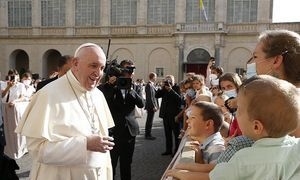
Extract from Gerard O’Connell, America, Jesuit Review 23 March 2021
Pope Francis today called on Catholic moral theologians, missionaries and confessors to follow the example of St. Alphonsus Maria de Liguori, the famous moral theologian and founder of the Redemptorists, who showed how “to keep together the demands of the Gospel and human fragility.” He invited them, following the example of the saint and bishop, “to enter into a living relationship with the members of God’s people and to look at life from their perspective in order to understand the real difficulties they encounter and to help heal their wounds.” Moral theology, the pope said, cannot be only about principles and formulations, but must respond to the reality of the person in need, “because knowledge of theoretical principles alone, as St. Alphonsus himself reminds us, is not enough to accompany and sustain consciences in discerning the good to be done.” “It is necessary that knowledge becomes practical through listening and welcoming of the least ones, the fragile ones, and the one who is considered discarded by society,” he added. Pope Francis emphasized that “the radical call of the Gospel must not be set against human weakness” and insisted that “it is always necessary to find the road that does not alienate [people] but brings hearts closer to God.” The remarks are representative of Francis’ general pastoral approach, as reflected in “Evangelii Gaudium,” which he referred to eight times in today’s message and has followed throughout his pontificate. And even though, as America has learned, Francis wrote today’s message prior to his recent trip to Iraq, the remarks may hold special significance to Catholics hurt by last week’s response from Congregation for the Doctrine of the Faith that states priests should not bless same-sex unions.....(more). Photo: Pope Francis greets family members CNS photo Paul Haring America Jes Rev 20210323
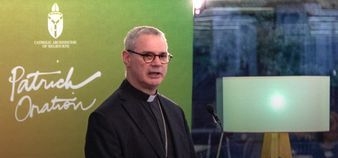
Extract from Archbishop Peter A Comensoli, Melbourne Catholic. 18 March 2021
Home-made bread. Who’d have thought that would be a thing in 2020? At the height of our hard lockdown, home-made bread made a come-back; and sourdough became a thing. Households across Melbourne started creating a culture, or they borrowed it from a neighbour. A bit of flour, some water, and time was all that was needed to crank up the fermenting process to create our own starters, delightfully called ‘Mother’. From a single Mother culture – appropriately fed and nurtured – came an endless gift of offspring. But why this, in the midst of our locked-down lives? In our exile from one another, this simplest of things became a way of re-claiming our humanity and of cultivating life – a leaven for our lives. During the ‘great exile’ of these past 12 months, our family households became the primary ways by which COVID-19 could be contained. Under the debilitating restrictions that entered every facet of our lives, we learnt – sometimes well, sometimes with hard work – to negotiate living arrangements; to accommodate personality traits; to live, work, play and pray from the same rooms. Our homes were the only places where you were not required to wear a mask; you could reveal your face quite literally – and by extension, your life – to others. Households became the ground on which to stand with any sense of safety and security, as our lives were pounded by the forces of the pandemic. On this Patrick Oration, two years ago (which feels like another lifetime, doesn’t it?), I spoke to you about a different ground we needed to stand on, a new land to cultivate. I spoke of the need to re-plant the Gospel into our local neighbourhoods of grace – our homes and communities, our movements and organisations, our parishes and schools. And I called for current-day St Patricks who would be the seed-planters of our time. As we now move tentatively out of exile – still in a state of ebb and flow, still uncertain of the future – we should not miss that COVID has shifted and sifted us. Where now is the ground on which we need to plant the gospel; and how do we step out towards it? How might we become the leaven needed for a more human way of living in this new world still emerging? Perhaps we can learn from our faith ancestors, in finding our identity by way of our households.....(more). Photo: Comensoli Patrick Oration Melbourne Catholic 20210318
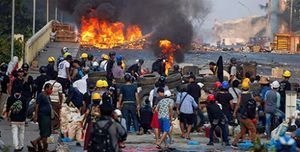
Extract from CathNews, CNS, 18 March 2021
As security forces in Myanmar intensify their crackdown on civilians, with disappearances, detentions and the killing of peaceful protesters, Pope Francis has appealed for an end to violence and the start of dialogue. “Once again, and with much sorrow, I feel compelled to mention the tragic situation in Myanmar, where so many people, especially young people, are losing their lives for offering hope to their country,” Pope Francis said at the end of his weekly general audience yesterday. Without mentioning her name, the Pope recalled the iconic gestures of Sr Ann Nu Thawng, who made headlines when photographs were published of her kneeling before police seeking to shield peaceful protesters and of her extending her arms begging police not to shoot or hurt anyone. “I, too, kneel on the streets of Myanmar and say, ‘Stop the violence’,” he said. “I, too, spread wide my arms and say, ‘Make way for dialogue’.” Bloodshed “resolves nothing”, the Pope said, repeating his call for dialogue to begin. The United Nations, human rights groups, bishops and Catholic organisations have condemned the actions of the Myanmar military, which has continued to crack down on protesters since its February 1 coup.....(more). Photo: Protesters barricade tyres clash security forces Yangon CNS Reuters CathNews 20210318

In a rare display of open disagreement with the Vatican, a number of bishops have publicly denounced a statement issued by the Congregation for Doctrine of the Faith
Limited extracts from subscription journal La Croix International, 18 March 2021
Numerous Catholic bishops from around the world have publicly denounced the Vatican's recent statement forbidding Church blessings for same-sex couples, calling the move "unacceptable", hurtful and clumsy. The Congregation for the Doctrine of the Faith (CDF) on March 15 published something called a responsum, along with explanatory note, that reiterated the Vatican's longstanding position that it is "illicit" for Catholic priests to bless same-sex unions. But in a rare display of open disagreement with the Vatican, bishops from several different countries immediately criticized the CDF intervention. "The pain the Church has caused them is today my pain". "I feel ashamed for my Church. I mainly feel intellectual and moral incomprehension," said Bishop Johan Bonny, 65, of Antwerp (Belgium). "I would like to apologize to all for whom this responsum is painful and incomprehensible. The pain the Church has caused them is today my pain," said Bonny, a Rome-trained theologian who worked at the Pontifical Council for Promoting Christian Unity from 1997 until his episcopal appointment in 2008. "Controlling who can or cannot receive God's blessing -- this is inadequate and wrong," said Franz Kreissl, director of pastoral services for the Diocese of St. Gallen in Switzerland. "It is not permissible to exclude a certain group from the outset as a 'sinner', without taking into account each individual concerned," Kreisel continued in a statement published March 16 on the diocesan website. "The mission of the Church is to bestow this blessing from God and to promise it to the people -- not by its own means, but as an intermediary," said St. Gallen's Bishop Markus Büchel..........."A Church that says we can't ordain women is equally obliged to ask how we might include women in leadership...a Church which says we can't bless same-sex unions is equally obliged to ask how we might include same-sex couples," tweeted Archbishop Mark Coleridge of Brisbane (Australia), a 72-year-old Rome-educated scripture scholar and former official at the Vatican's Secretary of State (1998-2002).....(source). Image: Gay Marriage blessings Ban, New Africa - Stocke Adobe com La Croix Int 20120218
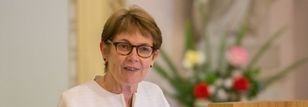
When women question the status quo with openness, frankness and boldness, they are ignored or figuratively told to go away by male gatekeepers, writes Good Samaritan Sister Patty Fawkner SGS.
Extract from Patty Fawkner, Good Oil, published here 18 March 2021
I didn’t know whether to laugh or cry, to be grateful or give vent to my frustration. This was my honest, mixed reaction with the news that Pope Francis had changed Canon 230 of Canon Law. “Lay people” could now be admitted to ministries of lector (reader) and acolyte (altar server), whereas previously the canon was restricted to “lay men”. In the wake of Francis’ announcement, I experienced the range of emotions expressed by other Catholic women. Like me, some women were somewhat bemused, others surprised, not realising that previously women weren’t allowed to fill these roles. Methinks that these women must have been fortunate to have clergy who had “allowed” them to read and to serve in the sanctuary, not only as cleaners or flower arrangers! Was this really a giant step for Catholic womankind? “Is it really progress to concede to women functions which they have carried out for decades, even during Masses in St Peter’s, a recognition that no women’s organisation ever asked for?” asked Veteran Catholic journalist Lucetta Scaraffia. Others were underwhelmed. Former Irish President, Mary McAleese, in typical feisty style, said that the new law was “the polar opposite of earth shattering … It is minimal but welcome all the same, for it is at last an acknowledgement that it was wrong of Pope Paul VI to ban women from the stable lay roles of lector and acolyte which remarkably he did after the Second Vatican Council.” Needless to say, Pope Francis did not go there!.....(more). Photo: Sister Patty Fawkner SGS Sisters of the Good Samaritan, 18 March 2021

Extract from Opinion Piece, Thomas Reese, Religion News Service, National Catholic Reporter, 17 March 2021
Since the Catholic Church forbids celebrating marriage between people of the same sex as a sacrament, some Catholics, and even some bishops, have discussed having a blessing for such couples as an alternative. On March 15, the Congregation for Doctrine of the Faith, the chief doctrinal office in the Vatican, responded to queries about this possibility with a firm no. "It is not licit to impart a blessing on relationships, or partnerships, even stable, that involve sexual activity outside of marriage," said the congregation. To sum up, the Vatican is calling on the church to welcome gays "with respect and sensitivity" while at the same time telling priests not to bless their unions. This fine distinction will make no sense to many American Catholics, especially those who are gay and believe that respecting a person includes accepting their choice of a life partner. In Germany it will put a chill on efforts by the country's Catholic bishops to consult the faithful on a number of topics, including gays, though a multiyear synodal process. Granted how much Pope Francis talks about the synodal character of the church, it is disappointing to see attempts to short-circuit this process in Germany. This preemptive strike, however, will not succeed. The discussion will go on, explained Bishop Georg Bätzing, president of the German bishops' conference, even as "points of view put forward today by the Congregation for the Doctrine of the Faith must and will naturally find their way into these discussions." The congregation made clear that Francis "was informed and gave his consent" to publication of the document. My guess is that he was given the document right before he left for Iraq and deferred to the congregation rather than subject the document to a close personal review. It lacks the pastoral sensitivity that has marked his papacy. Too bad he did not set it aside for more thought and consultation. The congregation sees pastoral and theological problems with blessing gay unions, although it has no problem with blessing gay individuals.....(more). Photo: People with rainbow flags Brandenburg Gate legalization of same-sex marriage Germany Michael Kappeler dpa via AP NCR 2021-317

This is going to be a COVID-19 kind of Lent, and that may be one of the best things that ever happens to our spiritual lives.
Extract from Joan Chittister, National Catholic Reporter, 17 March 2021
COVID-19 landed in the middle of our very busy selves and turned them upside down. The question is, is it all bad? The fact is that COVID-19 managed to do for us what we have not been able to do ourselves. For maybe years now. Here's the box score. COVID-19 has stopped our fevered running to and fro, back and forth, in life. And it's all been due to no plans of our own. There are simply places we should not go now. Crowds we should not be with. Trips we cannot take; parties we cannot give; routine things, like getting ready to meet a friend at the library — once so automatic we never gave it a thought — that now include things we can't forget any more. As in, get the mask. (No, not that one, the new one with the wire that holds it up.) Wash the hands again. Sit across the table from a friend rather than beside them. All simple things, daily things, normal things that we have to think about differently now. Where'd I put the extra masks? How many passengers can go in the van? What do you mean, the church is closed? The result of it all, I have discovered, is life-changing. COVID-19 has reduced us to the essence of ourselves. To the bare bones of our lives. The little things — meet that friend, go to that store, work with the dog running circles in the room — have tapped into the core of us, have shown us our own limitations, our own needs, as no "what-shall-I-give-up-for-Lent" game can ever do. COVID-19 has also taught us a form of patience. When there is no end date to something, our attention shifts to what's going on now, rather than later. Instead of concentrating on how long it will be till we can get to where we really want to go — since we can't go there anyway — we begin to think about what we might do now. But differently. We begin to ask ourselves a whole new set of questions, in fact. As in, what could be good for me to concentrate on now, that I can do alone? Or, what did we learn in the past about how to live when life stalled and felt dull and empty?....(more) Image: Lent about honest ourselves growing into Light Unsplash Dave Hoefler NCR 20210317
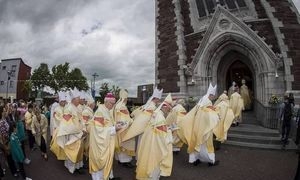
Extract from Charles Collins, Managing Editor, Cruxnow, 12 March 2021
The bishops made the announcement at the end of their annual Spring Meeting, which took place virtually due to the COVID-19 pandemic. The prelates called it a “pivotal time” for the Church in Ireland, and acknowledged they were “acutely aware of the huge challenges to the faith over the past fifty years from the rapid transformation and secularization of society” on the island. Ireland's Catholic bishops will embark on synodal pathway for the Church National Synodal Assembly within 5 years. Once one of the most Catholic nations in Europe, revelations about clerical sexual abuse has left public confidence in the Church at its lowest level in the history of Ireland. Not only has Mass attendance dropped significantly over the past quarter century, the Irish people have increasingly rejected laws seen as rooted in Catholic teaching.....(more). Photo: Irish prelates Cathedral of St Mary and St Anne Cillian Kelly CNS Cruxnow 2020112

Extract from CathNews, Sight Magazine, SMH, 12 March 2021
Brigidine Sister Brigid Arthur lost faith in Australian politicians a long time ago, making her a natural ally for a group of teenagers calling for action on climate change. Source: Sight Magazine. Equally fed up with political foot-dragging, the 86-year-old has joined eight students from across Australia in a landmark case seeking to block the expansion of the Whitehaven coal mine in New South Wales. The case, which was first heard in court last week, argues that Environment Minister Sussan Ley has a duty of care to protect young people from climate change that endangers their future. If successful, it could make it more difficult for coal mines to be approved in Australia, one of the world’s largest per capita carbon emitters and which is highly reliant on coal exports. Sr Brigid told the Thomas Reuters Foundation that governments in Australia have for “quite a long time” been “swayed by short-term objectives”, which leaves them unwilling to do anything that is “unpopular but in the long-term good for the country”. Sr Brigid, who set up the Brigidine Asylum Seekers Project charity in 2001, said she did not think twice when lawyers involved in the climate lawsuit asked her to be the litigation guardian for the students, aged 13 to 17, who – as minors – legally required an adult to give instructions on their behalf.....(more). Photo: Sr Brigid Arthur CAPSA,
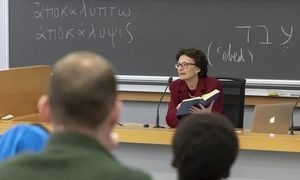
Extract from Crux, 11 March 2021
ROME — Pope Francis has named Sister Nuria Calduch-Benages, an Old Testament scholar and professor at Rome’s Pontifical Gregorian University, to be secretary of the Pontifical Biblical Commission. The Spanish member of the Missionaries of the Holy Family of Nazareth is the first woman to hold the position, which involves coordinating the work of the 20 biblical scholars from around the world who study topics in Scripture studies and interpretation on behalf of the Congregation for the Doctrine of the Faith. According to the norms of the commission, as revised by St. Paul VI in 1971, the secretary of the Pontifical Biblical Commission also serves as a consultant to the Congregation for the Doctrine of the Faith.....(more). Photo:Sister Nuria Calduch-Benages CNS photo courtesy Pontifical Gregorian University, Crux 20210311
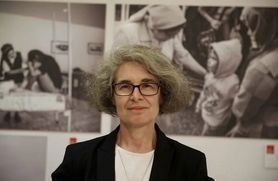
Extract from Elise Ann Allen, senior correspondent, Crux, 9 March 2021
Speaking during a March 8 panel organized by the Australian Embassy to the Holy See, Sister Nathalie Becquart, Undersecretary to the General Secretariat of the Synod of Bishops, said Pope Francis is calling the Church “to recognize the legitimate place of women” at all levels of the Church in order to achieve “greater justice and equality, and he calls the Church to respect women’s rights.” However, she said the push to include more women in positions of leadership and authority must be done with an emphasis on “greater reciprocity between males and females.” “Synodality is also about bringing all the voices of the people of God,” she said, voicing hope that this will form part of the discussion during the 2022 Synod of Bishops on Synodality. Becquart, who is the first woman ever to be appointed to her position, and who consequentially will become the first woman to vote in a synod of bishops during the 2022 gathering, stressed the need for a greater sense of co-responsibility between men and women in the Church. “Co-responsibility is truly the key to this time of crisis in society and in the Church, not only the crisis of sex abuse and abuses of power, but also the crisis with COVID and difficulties in different countries with political crisis, the economic crisis,” she said, noting that men and women offer different, but equally valuable perspectives to problem solving.....(more). Photo: Sister Nathalie Becquart AP Photo Alessandra Tarantino Crux 20210309

Extract from CathNews NZ, NBC News, CGTN, 8 March 2021
The Education Ministry of China has published plans to ‘cultivate masculinity’ in schoolboys. The policy has inflamed debate across the country. The plan follows a warning from one of China’s top political advisers that the nation is experiencing a national “masculinity crisis.” “Chinese boys have been spoiled by housewives and female teachers,” the adviser, Si Zefu, said in a policy proposal in May. Boys would soon become “delicate, timid and effeminate” unless action was taken, he said. Addressing the issue is a matter of national security, he wrote. Si warned that the “feminization” of Chinese boys “threatens China’s survival and development.” Boys in China traditionally are expected to show strong leadership skills, get good grades in math and science and excel in school sports. So wrote Fang Gang, a sociology professor at Beijing Forestry University, about the proposed changes on Jan. 30. Girls, meanwhile, traditionally are viewed as less intellectual, and they are expected to be less competitive. “Boys don’t need masculinity education,” said Lü Pin, the founder of China’s largest feminist advocacy media channel, Feminist Voices, which was banned by Chinese censors in 2018. “The concept of masculinity forces every man to be tough, excluding and harming men with other characteristics,” she said. “It also reinforces men’s hegemony, control and position over women, which goes against gender equality.”....(more). Photo:Masculinity-in-China CathNews NZ 20210308
Extract from CathNews NZ, 8 March 2021
Representatives of Anglican, Catholic, Presbyterian churches and leaders of the Salvation Army will give evidence later this month at the Royal Commission of Inquiry into Abuse in Care. They will be asked to explain their processes for resolving historic and current abuse claims and to respond to survivors’ evidence. The Inquiry’s second phase, which is set to run from 15 to 29 March, will focus specifically on the senior clergy’s evidence. The Inquiry’s first phase was held late last year. It focused on survivors’ experience in seeking redress for abuse and/or neglect while they were in the care of faith-based institutions.....(more)

Extract from ACBC Media Blog, Friday 5 March 2021
Catholic women are invited to participate in a national consultation with two bishops later this month and to mark their diaries for a national gathering in September. The national consultation, which will take place on March 27 via Zoom, invites women to articulate and celebrate their contribution to and vision for the mission of the Church in Australia. Bishop Michael Morrissey, the Bishop Delegate for Women, said he is looking forward to hearing from Catholic women from across the country. “The thoughts, the voices and the actions of women within the Catholic Church are absolutely central to our life and mission, and the national consultation invites a sharing and listening that will benefit the whole Church,” he said. The consultation is being organised by the Bishops Commission for Evangelisation, Laity and Ministry, whose mandate includes the place and role of lay women and men in the Church. Archbishop Christopher Prowse, the chair of that Bishops Commission, will join Bishop Morrissey in participating in the online consultation. Clara Geoghegan, the executive secretary of the Bishops Commission and the coordinator of the consultation, said women she had spoken with were supportive of the idea of a national conversation. “Women are looking forward to the opportunity to speak with the two bishops and with one another and, as invited by the great document Gaudium et Spes, to share their joys and their hopes, their griefs and their anxieties, for the Church in Australia.” While the discussions during this month’s consultation are expected to help shape proposals and strategies over several years, they will also inform the development of the agenda for the Catholic women’s event on September 11.....(more) Photo: Consultation for Women ACBC Media Blog 202100305
Limited comments based on a report by Colleen Dulle, subscription journal America. The Jesuit Review, 4 February 2021
Through a secretive selection process, Pope Francis's task of selecting bishops will be assisted by Cardinal Tobin and fellow US bishop Cardinal Blase Cupich. Source

Extract from CathNews NZ, 4 March 2021
Anne Barrett Doyle is a devoted mother, practicing Catholic, and one of the fiercest crusaders against clergy sex abuse. Are you Catholic?” Anne Barrett Doyle smiled at me expectantly with kind, sea-green eyes. It was months before the pandemic hit, and Barrett Doyle had invited me over to the Boston loft she and her husband moved into after the last of their four kids left for college. A crucifix hung on the wall, and a Jesus statuette prayed from a wooden desk. Several Bibles lined the bookshelf. We sat side by side on a plush beige couch. Barrett Doyle, small and soft-spoken, with shoulder-length auburn hair and rosy cheeks, folded her hands politely and crossed her ankles. As co-director of Bishop Accountability, an archive documenting the sexual abuse problems of the Catholic Church, Barrett Doyle has devoted her life to chronicling the prosecution of priests who have sexually abused and assaulted children and teenagers. Barrett Doyle is one of just a handful of women fighting to expose clergy predation, both hailed as a hero by survivors and denounced as apostate by some within the Church. She is also an ardent, unapologetic Catholic.....(more). Photo: anne-barrett-doyle CathNews NZ 20210304
https://cathnews.co.nz/2021/03/04/anne-barrett-doyle/
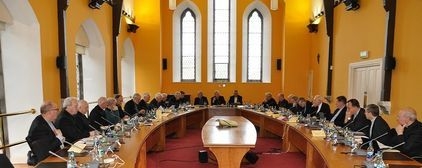
Address of Cardinal Mario Grech to the Bishops of Ireland
Extract from General Secretariat Synod of Bishops, Vatican, Ist published 3 February 2021, reprinted here 4 March 2021
.........In the synodal way lies one of the answers to the question I have been asking. If the church wants to become a missionary church, then it has to be a synodal Church, for synodality is not just a methodological choice, but the mode of being of a church which wants to go out in mission. Indeed, synodality is not only a methodos but an odos, not only a method but a way towards a re-thinking of the Church’s role in contemporary society. Indeed, synodality is at the way towards a Church which is in a permanent state of a mission. This is clearly articulated by the International Theological Commission in its document, Synodality in the life and mission of the Church. “Making a synodal Church a reality is an indispensable precondition for a new missionary energy that will involve the entire People of God” (9). The document emphasizes that “Synodality is lived out in the Church in the service of mission. Ecclesia peregrinans natura sua missionaria est; she exists in order to evangelize. The whole People of God is an agent of the proclamation of the Gospel. Every baptized person is called to be a protagonist of mission since we are all missionary disciples. The Church is called, in synodal synergy, to activate the ministries and charisms present in her life and to listen to the voice of the Spirit, in order to discern the ways of evangelisation” (53). Synodality is the particular style that qualifies the life and mission of the Church, expressing her nature as the People of God journeying together and gathering in assembly, summoned by the Lord Jesus in the power of the Holy Spirit to proclaim the Gospel. Synodality ought to be expressed in the Church’s ordinary way of living and working (70 a). Chapter three of the Final document of the Synod on youth elaborates the theme of “missionary synodality” and presents synodality as the key for evangelization. The Synod Fathers clearly state that “Synodality is the method by which the Church can address ancient and new challenges, gathering and bringing into dialogue the gifts of all her members, starting with the young” (Christus Vivit, 144). As a matter of fact, the goal of a synodal process is to proclaim the Gospel in a given context to meet the particular challenges of the people living in that place. Thus, it is fundamental for the synodal Church to scrutinize the signs of the times.....(more). Photo: Irish Catholic Bishops Conference 2019, Vatican 20210203
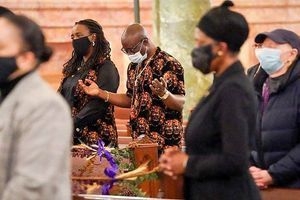
Extract from Madeleine Davison, National Catholic Reporter, 4 March 2021
The vast majority of Black Catholics say fighting racism and sexism is essential to their faith, yet the majority-white churches they often attend are failing to meet their needs, said speakers on a Feb. 25 panel on Black Catholics' faith and religious practices. "We [Black Catholics] believe on some level that the church needs us sometimes more than we need the church," said Fr. Bryan Massingale, professor of ethics and theology at Fordham University and author of Racial Justice and the Catholic Church, during the panel. The discussion, "Black Churches, Black Catholics," was hosted by the Fordham University Center on Religion and Culture. Speakers analyzed the results of a nationally-representative survey of more than 8,600 Black adults published in February by the Pew Research Center. The study, speakers said, is one of the most comprehensive such studies on Black faith and religion in the U.S., allowing researchers to dig into the nuanced beliefs and practices of those in smaller subgroups, including Black Catholics, who make up 6% of the Black population, according to the survey. Black Catholics are somewhat less religious by some measures than their Black Protestant peers, according to the survey. For instance, Catholics are less likely to say their faith is a very important part of their life and less likely to attend services at least once a year than Protestants, said Kiana Cox, a research associate at Pew who helped conduct the survey, during the panel. But 82% of Black Catholics say their Blackness is a somewhat or very important part of how they think of themselves, similar to Black Protestants and people of other faiths. According to the survey, 77% of Black Catholics said opposing racism is "essential" to their faith, and 75% said the same about opposing sexism. Belief in God was essential for 73% of Black Catholics.....(more). Photo:Black History Month Thanksgiving Mass 2021 Brooklyn NY CNS Gregory A Shemitz NCR 20200304
Released this week, the Plenary’s starting document addresses realities the Church must face
Extracts from Daniel Ang, The Catholic Weekly, 4 March 2021
With the Plenary Council only seven months away, the Church in Australia looks to its future with recognition of the urgency of renewal. The Instrumentum Laboris or working document released this week underscores distinct dimensions of the Church’s life that cry out for renewal, if not conversion. In studying the various papers and submissions as a member of the writing group, the call for change in the final document was particularly clear for our parishes and school systems, the spiritual renewal of clergy and families, the protection of life and religious freedom, reform of the practice of governance, and the reinvigoration of co-responsibility in service of the Church’s mission to evangelise, to name just a few. Charting the future Of course, the sexual abuse crisis and related failures in governance lend magnitude to this moment as decisions must be made, and will be made, that chart the course of the Church in Australia for some decades to come........A response is necessary The deliberations that the Instrumentum Laboris will provoke will demand of us all a commitment to the humility of prayer and the active discernment and interpretation of these mixed realities in the light of the Gospel. It also demands on the part of each of us the work of personal conversion, a move from an ethic of self-preservation to the embrace of that genuinely missionary option to which Christ calls each of us as members of His body, renewing the Church by reaching the world as it really is in Him.....(more)
Ten thousand clerical sex abuse cases in France
Extract from Tom Heneghan, The Tablet, 3 March 2021
At least 10,000 cases of sexual abuse have taken place in the Catholic Church in France since 1950, according to a senior retired judge. Jean-Marc Sauvé, a respected retired judge who heads the independent commission investigating sexual abuse, confirmed to journalists on Tuesday that it had found “at least 10,000” cases of sexual abuse in the Church since 1950. That was a jump from his announcement last June of “at least 3,000” cases, and he said researchers still had more archives to work through. He disclosed his latest findings shortly after France’s bishops held an extraordinary plenary assembly by video conference last month to ponder their moral responsibility in the sexual abuse crisis. Participants said it helped them better understand the abuse scandal and examine what obligation they had for crimes committed decades ago. Church leaders have said victims deserved some financial reparation from them, but left details until later....(more)
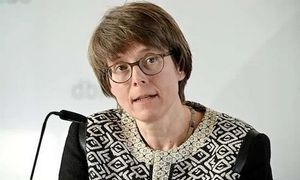
Germany's Catholic bishops have chosen a female theologian and liturgist as the first woman ever to serve as secretary general of their national episcopal conference.
Limited extract from Christa Pongratz-Lippitt Subscription Journal La Croix International, 3 March 2021
Beate Gilles, 50, is also the first lay person in the 172-year history of the German Bishops' Conference (DBK) to hold this key post. She takes over from Jesuit Father Hans Langendörfer who was conference secretary general for 24 years. Gilles, who is unmarried and has no children, takes up her new duties on July 1. Her appointment was announced on February 21 at the conclusion of the DBK spring assembly. A strong sign in favor of women leadership. Bishop Georg Bätzing, the DBK president, said it was a "strong sign that the bishops are delivering on their commitment to promote women to leading positions in the Church". Gilles earned a doctorate in theology with a specialization in liturgy. She wrote her doctoral thesis on the broadcasting of religious services. She has represented the dioceses of Limburg, Mainz and Fulda in Hess Broadcasting (a regional broadcasting corporation of the first German national TV channel ARD) since 2019. The Cologne native has also headed the department for children, young people and families in Limburg Diocese since 2020. At her first press conference, Gilles emphasized that for her the German Church and the ongoing German synodal procedure for Church reform would take center stage.....(more). Photo: Theologian Beate Gilles Diocese Limburg Sec Gen bishops conf Sascha Steinbach EPA Pool dpa MaxPPP
Why is the reception of the council still an issue?
Extract from Massimo Faggioli, Commonweal, 2 March 2021
Pope Francis has said some interesting things about Vatican II in the last several weeks. On January 11, in a letter to the cardinal prefect of the Congregation for the Doctrine of the Faith accompanying his motu proprio allowing women to become lectors and acolytes, the pope described his decision in terms of the “horizon of renewal traced by the Second Vatican Council” and “in line with the Second Vatican Council.” Then came these remarks in his January 29 speech to the national catechetical office of the Italian bishops’ conference: This is the magisterium: the Council is the magisterium of the Church. Either you are with the Church and therefore you follow the Council, and if you do not follow the Council or you interpret it in your own way, as you wish, you are not with the Church. We must be demanding and strict on this point. The Council should not be negotiated in order to have more of these.... No, the Council is as it is. And this problem that we are experiencing, of selectivity with respect to the Council, has been repeated throughout history with other Councils. As with all other teachings by Francis, these statements speak in a particularly direct way to U.S. Catholicism. In recent months, some bishops and clerics have tried to advance a theologically defensible conservative interpretation of Vatican II, something to counter the extremist views of Archbishop Carlo Maria Viganò and a group of like-minded quasi-schismatics, who in addition to rejecting the “Bergolian” magisterium have taken a position that’s hard to distinguish from pure and simple rejection of the council’s teachings. Bishop Robert Barron, for example, has spoken of attacks on Vatican II as a “disturbing trend,” and Thomas Weinandy, former executive director of the Secretariat for Doctrine and Pastoral Practices of the USCCB, has chastised Viganò for challenging the council’s authenticity. But there’s more than theological interpretation to consider. The alliance of conservative American Catholicism with Trumpism also says something about the reception of Vatican II; the fascination some have for a quasi-Caesarean political leadership is a symptom of the council’s failure in this country. Yet even if this is most evident among the extreme voices on the conservative side of the spectrum, it’s not a uniquely conservative problem. There are broader systemic phenomena in play, which in the last few years have exposed fault lines on the liberal-progressive side as well.......(MORE)
Extract from Melbourne Catholic. 1 March 2021
Catholic Health Australia (CHA) is urging the Morrison Government to not let a once in a generation opportunity presented by the Royal Commission for lasting and meaningful reform pass it by. CHA, which is the largest grouping of non-government aged care providers, said in its response to the Commission’s final report the Government should concentrate its efforts on four key areas: Giving families choice and control over the type of care they need, including gradually removing the waiting list for home care packages and ending the rationing of services; Putting in place more staff and training and paying them properly; Increased disclosure and transparency that rates performance; Providing timely access by older people in aged care to the services of the wider health system. CHA CEO Pat Garcia acknowledged the hard but necessary work undertaken by the Commission and said his members were looking forward to hearing the Government's response in full. Our members recognise that significant reform is needed to deliver an aged care system that really caters for the needs of older Australians and puts them at the very centre of what we do. They absolutely recognise that they have a role to play in helping and they stand ready to assist the government in the implementation. 'This is a once in a generation opportunity to deliver for our older Australians a future where they have the right information so that they are able to choose the care that best suits them and their needs. 'This is a moment in time and the Morrison Government is uniquely placed to deliver major reforms that will take some years to fully take effect but will deliver a compassionate and consumer-centric system for decades to come.' 'However, if we want high-quality aged care and more better trained and better paid staff looking after our older Australians then we have to pay for it. The Federal Budget in May is a key starting point for the sector but we also need to recognise that it cannot be funded entirely by the Commonwealth alone.'....(more)
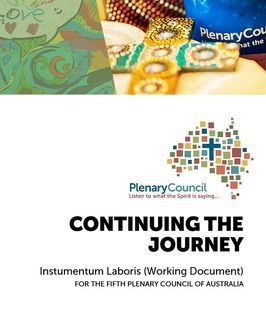
Extract from Plenary Post, 25 February 2021
There are just 219 days until the opening of the first assembly of the Plenary Council. And while there is a sense of deja vu about that, with significant preparations taking place early last year before the assemblies were delayed by 12 months, there's also renewed energy -- some of which is captured in the stories below. As you will read, another milestone has been reached, with today's release of Continuing the Journey, the working document -- or instrumentum laboris -- for the Plenary Council. The document draws from the richness of the voices of the People of God, captured during the Listening and Dialogue and Listening and Discernment phases, as well as papal writings, bishops' statements and key documents from within and beyond Church to inform the Plenary Council journey. In addition to the document itself, a new podcast series featuring interviews with those on the writing team for Continuing the Journey and a reflection guide might be helpful. The reflection guide, which is a continuation of the guides at other stages of this journey, invites people to pray and discern with the document individually or in small groups. Our journey is national, but the local reflection has proven to be a source of great fruit. There's much more to read about below. Keep an eye out for future editions of Plenary Post on the last Thursday of each month through 2021.......Plenary Post HERE. Instrumentum Laboris HERE
Theologian argues for a greater participation of lay people when the Synod of Bishops meets next October in Rome to discuss the nature of "synodality" in the Catholic Church
Limited Extract from Agnès Desmazières, France, Subscription journal La Croix International, 22 February 2021
The Second Vatican Council (1962-65) was the opportunity for a significant contribution of lay men and women, especially in thinking about the Church's dialogue with the world. The theme of the next assembly of the Synod of Bishops, "For a synodal Church: communion, participation and mission", calls for a renewed participation of the laity. Pope Francis has insisted on this several times recently and made a strong mark by opening instituted ministries to women. A synodal Church is a Church in which all the faithful enjoy equal dignity and walk together in communion.
Every baptized person is invited to participate actively and effectively in the common mission of the Church, according to his or her own vocation. As missionary disciples, all are called to proclaim the Gospel whatever their state in life and, by the same token, to be co-responsible for the Church's destiny along the way. Therefore, it seems crucial for the future of a Church shaken by crises that the laity be allowed to participate effectively in the next Synod assembly. Naturally, while respecting the particular nature of this synodal institution as being "of bishops". The recent appointment of a religious sister as under-secretary of the general secretariat of the Synod of Bishops, with the right to vote, gives hope that lay men and women may also have the right to vote in the next assembly. The exercise of the co-responsibility of the laity is rooted in their dignity as baptized persons. All vocations are necessary for the Church. All the baptized participate in God's plan and are intended to flourish in relationship -- not in a spirit of competition or a quest for a position of power, but in the service of the Church and of humanity......(source)

We are not separate people from our world; rather, we are called to engage with it.
Extract from Terry Kean, Australia, La Croix International, Swag, republished here 22 February 2021
The Catholic Church in Australia had hoped to commence a Plenary Council last October. Unfortunately, it was postponed for at least another year because of COVID-19. But the issues the Council will have as its focus have probably only become more urgent. As to how we will regather as a Church, not only in Australia, but across the world, is a question that all of us will find very challenging. I recently wrote to the committee that is preparing the Instrumentum Laboris -- or working paper -- for the Council. And the following is, more or less, what I shared with them. I am a diocesan priest nearing retirement after 50 years of parish ministry in Melbourne Archdiocese. I have loved the journey and I am very grateful for the Catholic Church of Melbourne. However, a deep sadness has grown within me as I see the diminishment of the Church and the increasing numbers of parishioners who do not come to Eucharist. Or if they come, it is more for special occasions. I have lamented the terrible actions of priests and religious who have abused young people. And I have also lamented what I see as a growing clericalism with our Church. So many of my priest colleagues lead with power and authority, rather than with empowering and authorizing. Confident that the Spirit of God will lead the Church to a new story. In thinking about the Plenary Council, I have to say that I am not confident there will be the great change that I think is necessary for the Church of the future. I fear that our bishops will look to manage rather than imagine a Church of the future. It seems to me that we will not change much and for that reason I think the Catholic Church --- not only here in Australia, but around the world -- will shatter and from the pieces a new story will begin. Who knows what that will look like, but I am confident that the Spirit of God will lead the new story wherever it takes us. And I imagine it will be a very different story from what we have experienced in our lifetime. It is more than likely that the Catholic Church will have a major schism. In some ways this is already happening as more and more people find other ways of expressing their spirituality. If the institutional Church seeks to control, legislate and manage a difficult situation as it tries to negotiate the views of so-called conservative and liberal Catholics, then I believe the Plenary Council will not achieve much, if anything. As it stands, the vote rests primarily in the hands of the bishops and there is a serious question as to a governance that so limits the voice of the faithful. But if the institutional Church seeks to empower the voice of the faithful, and encourages small communities of people to come together, largely making their own way, then the needed reforms may arise. The necessary reforms to empower a priesthood of the people and a more creative and compassionate Church might then be born.....(more). Photo: La Croix International 20210222
Extract from Bruce Duncan, Pearls & Irritations, John Menadue website, 21 February 2021
Church social teaching is strongly opposed to neoliberalism, so how did this opposition become so muted, with prominent Catholic voices and resources captured by neoliberal ideology and money? The assault on the US Capitol building by Trump supporters trying to overturn the election not only shocked the United States but raises urgent questions for the rest of the world, particularly for the churches, and for Australians too. The mob was shouting to kill House Speaker Nancy Pelosi and even Vice-President Mike Pence. The Congress people fled to underground bunkers in fear of their lives. Clearly Trump exploited the feelings of disadvantage and economic distress of millions of Americans. Elite groups in the US and elsewhere have done spectacularly well from the recent patterns of globalisation, but median wages for white males in the US have barely risen in 60 years and millions of jobs have disappeared overseas. As the prominent economist Joseph Stiglitz has argued, control over the processes of globalisation has in recent decades been captured by giant corporations and the wealthy elites, hollowing out the US middle class and driving many others into economic stress and poverty. He blames the ideology of ‘market fundamentalism’ or neoliberalism for the extreme and growing inequality. (See his 2018 Globalization and its Discontents Revisited: Anti-Globalization in the Era of Trump). Church social teaching is strongly opposed to neoliberalism, so how did this opposition become so muted, with prominent Catholic voices and resources captured by neoliberal ideology and money? And how could such a morally questionable character as Trump attract the votes of so many Christians including some 50% of Catholics?....(more)
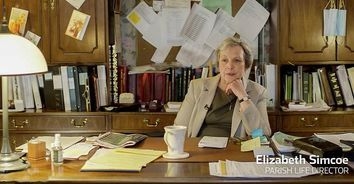
Extracts from America, the Jesuit Review, 18 February 2021
The day begins with a beautiful sunrise: pinks, purples and blues that help dispel the heaviness of our continued slogging through a Covid-19 world. As we begin to assemble for Mass, everyone comments on what they had seen. Father F says he had reoriented his chair for morning prayer so he could watch the day unfolding. God will not be outdone in generosity. I serve this community, the Church of St. Vincent DePaul, as a parish life director, a position also known as parish life coordinator, which is a lay leader of a parish under the norms of Canon 517.2: “The diocesan bishop [may decide] that participation in the exercise of the pastoral care of a parish [may be] entrusted to a deacon, to another person who is not a priest or to a community of persons.” After the first Mass of the day, Terrence and Davion, regulars at the parish, wait at the entrance to ask for help: a grocery store gift card for Terrence and the same, plus a one-day bus pass, for Davion. But Davion had an additional problem: a swollen face and an emergency room report with a prescription for antibiotics. “I don’t know how I am going to pay for this,” he says. “It costs $40.” We are not exactly sure what Davion’s living arrangements are. I suspect that his one-day bus passes are used not so much to take him from one place to another as they are a way for him to stay safe and out of the cold. After the first Mass of the day, Terrence and Davion, regulars at the parish, wait at the entrance to ask for help: a grocery store gift card for Terrence and the same, plus a one-day bus pass, for Davion. But Davion had an additional problem: a swollen face and an emergency room report with a prescription for antibiotics. “I don’t know how I am going to pay for this,” he says. “It costs $40.” We are not exactly sure what Davion’s living arrangements are. I suspect that his one-day bus passes are used not so much to take him from one place to another as they are a way for him to stay safe and out of the cold.....Eventually, it came to be seen that urban and suburban parishes could be led through this model. Many priests were retiring from their roles as pastors but still wanted to serve in ministry. They did not want the headaches of administration nor did they want to be “road warriors,” traveling the highways of the diocese to assist in an ad hoc way with the sacramental life of communities. Parish life directors could lead parishes in collaboration with these retired priests or priests with a diocesan leadership assignment. Bishop Edward Scharfenberger, Bishop Hubbard’s successor, has continued to make these appointments..........(more). Photo: America, Screenshot. The Jesuit Review 20210218
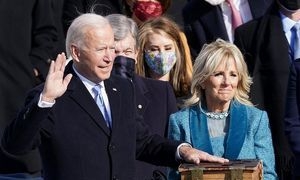
Extract from Michael J. O’Loughlin, America, the Jesuit Review, 16 February 2021
Following the inauguration of President Joseph R. Biden Jr., the head of the U.S. Conference of Catholic Bishops, Archbishop José Gomez, released a lengthy statement, in which he laid out areas in which the bishops may work well with the new administration. But it also included a stinging rebuke of the president’s support for “policies that would advance moral evils and threaten human life and dignity, most seriously in the areas of abortion, contraception, marriage and gender.” Archbishop Gomez’s letter was unusually lengthy and struck some Catholics as tone-deaf, given the present opportunity for a fresh start with a new president. Among these critics was Cardinal Blase Cupich, archbishop of Chicago, who released his own statement calling Archbishop Gomez’s statement “ill-considered” and said other bishops should have been given an opportunity to weigh in on the statement before it was released. By the end of the day, at least one other cardinal made comments and one other bishop released a statement that was more conciliatory toward Mr. Biden. In an article for America, I called the public disagreement “rare”; another journalist called it “unusual”; and yet another described it as “unprecedented.” Following the inauguration of President Joseph R. Biden Jr., the head of the U.S. Conference of Catholic Bishops, Archbishop José Gomez, released a lengthy statement, in which he laid out areas in which the bishops may work well with the new administration. But it also included a stinging rebuke of the president’s support for “policies that would advance moral evils and threaten human life and dignity, most seriously in the areas of abortion, contraception, marriage and gender.” Archbishop Gomez’s letter was unusually lengthy and struck some Catholics as tone-deaf, given the present opportunity for a fresh start with a new president. Among these critics was Cardinal Blase Cupich, archbishop of Chicago, who released his own statement calling Archbishop Gomez’s statement “ill-considered” and said other bishops should have been given an opportunity to weigh in on the statement before it was released. By the end of the day, at least one other cardinal made comments and one other bishop released a statement that was more conciliatory toward Mr. Biden.....(more) Photo: Biden inauguration CNS Kevin Lamarque, Reuters America Jesuit Review 20210216

Extract from David Timbs, Pearls & Irritations, John Menadue website, 14 February 2021
Only seven of the 28 Australian Catholic dioceses have pastoral councils. It seems that protecting the independence of ecclesiastical fiefdoms is more important than promoting the common good of the Church in this country. Towards the end of the Second Vatican Council (1962-65), Pope Paul VI was asked to consider establishing a permanent consultative group of bishops, with a rotating membership, to assist him and future Popes with the day to day governance of the Church. Pope Francis has adopted a modified form of this with an inner cabinet of Cardinals who now advise him on a regular basis. Pope Francis has made it abundantly clear that Synodality, or collaborative leadership, should be re-integrated permanently into all Church governance structures and without exception. Synodality has become a key theme of his papacy that is supported by Vatican II’s Christus Dominus, 27: ‘it is highly desirable” that in each diocese a pastoral council be established as a consultative body that advises the bishop on challenges facing the diocese, on pastoral activity and forward planning. Canon 511 is equally clear that, “in each diocese, in so far as pastoral circumstances suggest, a pastoral council is to be established.” However, it is the conditionals in both documents that provide the bishops with convenient escape clauses. Pope Francis could not be any clearer on the fundamental importance for all Catholics to accept the authority of the Second Vatican Council. After being effectively shelved for decades under John Paul II and Benedict XVI, Vatican II has been reinstated as the essential blueprint for authentic reform and renewal. In a January 30 address to the Italian Bishops Conference, Francis insisted that: “The Council is the Magisterium (highest teaching office) of the Church. Either you are with the Church and therefore you follow the Council, and if you don’t follow the Council or you interpret it in your own away, as you desire, you do not stand with the Church. The Council must not be negotiated… No: the Council is what it is.” The message is not just for the Italian bishops.....(more)
Extract from Joshua J. McElwee, National Catholic Reporter, Global Sisters report, 10 February 2020
Rome — The first woman selected to serve as an undersecretary for the Vatican's office for the Synod of Bishops said Feb. 10 that she hopes her appointment will help "open up new possibilities" for women in the Catholic Church. "Co-responsibility is the way we are going to work ahead," said Becquart, speaking at a briefing organized by the International Union of Superiors General, the Rome-based umbrella network of women's religious orders across the world. The office of the Synod of Bishops is primarily tasked with helping organize synod meetings, which bring hundreds of Catholic bishops to Rome every few years to discuss topics chosen by the pope. The synod office is led by Cardinal Mario Grech. Francis appointed Becquart and Augustinian Fr. Luis Marín de San Martín to share duties as the department's second-in-command leaders. At the same time, the pope also made San Martín a bishop. Some have hailed Becquart's appointment to the office as a signal that Francis may choose to make her the first woman to serve as a full voting member at the next Synod of Bishops, scheduled for October 2022. Although women have been appointed to synods in non-voting capacities as auditors or experts, none has yet served as a full voting member.....(more).
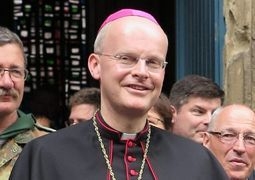
Extract from The Pillar, Germany, 8 February 2021
The Vatican is reviewing a set of proposals under consideration for approval by the general assembly of the “Synodal Path” of the Catholic Church in Germany. The proposals include the election of bishops and pastors by Church members, elected lay committees with the power to overrule the decisions of bishops, and for a vote among German Catholics on the ordination of women to the priesthood. The proposals are made in a document called the “Fundamental Text” of the synod’s Forum I, a working group focused on proposing changes to the Catholic Church’s structures of governance. The Pillar obtained a copy of the document, which has been sent to Church leaders in Germany. The text was adopted by the working group in December, and has been made available to all members of the “synodal path,” an official assembly of German bishops and lay delegates that aims to suggest structural and doctrinal changes to the Catholic Church in Germany. The working group is chaired by Bishop Franz-Josef Overbeck, who has expressed openness to the priestly ordination of woman, and by Claudia Luecking-Miche of the Central Committee of German Catholics, an influential lay organization partnered with the German bishops’ conference to organize the country’s “synodal path.” Organizers will schedule a vote of the entire synodal assembly on whether to adopt the “Fundamental Text” as an official resolution of the synod. Addressing the Church’s systems of governance, the text urged that “monistic structure of powers must be overcome, according to which the legislative, executive and judicial powers are concentrated exclusively in the office of the bishop and, at the parish level, all leadership authority lies with the pastor, who can delegate it partially to others, but can also withdraw it from him at any time in the event of conflict.”....(more). Photo: Bishop Franz-Josef Overbeck Credit AcBahn wikimedia The Pillar 20210208
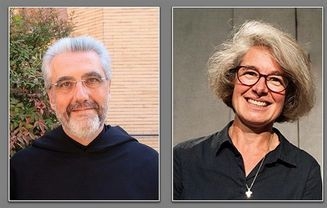
Pope appoints woman Under-Secretary at Synod of Bishops
Pope Francis appoints two new Under-Secretaries to the General Secretariat of the Synod of Bishops: Sr Nathalie Becquart and Fr Luis Marín de San Martín.
By Vatican News staff writer, Vatican News, 6 February 2021
Pope Francis has appointed Sr Nathalie Becquart and Fr Luis Marín de San Martín to be the Under-Secretaries of the Synod of Bishops. Currently headed by Cardinal Mario Grech, the Synod of Bishops is a permanent institution established by Pope Paul VI in 1965, in response to the desire of the Fathers of the Second Vatican Council to keep alive the spirit of collegiality engendered by the conciliar experience. The appointment of Sr Natalie Becquart is particularly interesting as it is the first time ever a woman has been appointed to this position. Biography Sr Nathalie Becquart. Nathalie Becquart was born in 1969 in Fontainebleau, France. She graduated from the HEC school of management with a Master in Management with a specialization in Entrepreneurship in Jouy-en-Josas in 1992, and went on to study philosophy at the Sorbonne University in Paris. Between 1992-1993 she spent her volunteer year in Beirut, Lebanon, working as a Professor of Mathematics and French in a Catholic High School and taking philosophy and theology courses at ISSR-St Joseph Jesuit University of Beirut. This was followed by two years working as a Consultant in a marketing and advertising agency for NGO’s and Christian organizations (EJC consulting) in Paris. Nathalie Joined the Xaviere sisters, missionaries of Christ-Jesus (Apostolic Congregation of Ignatian Spirituality) in August 1995 and took her final vows in September 2005. She has since worked in various roles including Spiritual Director for the Ignatian Youth Network in France National Coordinator of the scouting program for youth in poor urban multicultural areas, Scouts de France; President of the Ignatian association “Life at Sea, entry into prayer”; Director of Campus Ministry in Créteil (University of East Paris) and member of the diocesan office of youth ministry, WYD diocesan coordinator in 2007-2008; Deputy Director of the National Service for the Evangelization of Youth and for Vocations (SNEJV), in charge of university pastoral care, at the French Episcopal Conference; Director of the National Service for the Evangelization of Youth and for Vocations (SNEJV) at the French Bishop’s conference (Sept. 2012-August 2018 for a 6 years term); Member of the Bishop’s council of the Diocese of Nanterre France (with Bishop Michel Aupetit, who is now the Archbishop of Paris); Vice-President of the European Vocations Service (CCEE).....(more). Photo: Fr Luis Marin and Sr Nathalie Becquart, Vatican News

It was a rare act of cooperation between the Catholic and the Muslim communities of Melbourne: a full page advertisement in The Age of a joint letter of protest. That is, if it weren’t for the content of the letter. The letter’s authors, the President of the Islamic Society of Victoria and several Victorian Catholic bishops, disingenuously make the unrestricted claim that the Victorian Change or Suppression (Conversion) Practices Prohibition Bill legislates for what prayer is legal and what prayer is not. In fact, the scope of the Bill is restricted to forms of prayer about which complaints have been made to the Victorian Health Complaints Commission, prayer of a very specific kind: one aimed at converting from or suppressing forms of sexuality regarded by its supplicants as deviant. The Muslim community must give their own reasons for regarding non-heterosexual sexualities as deviant. The Catholic community, however, has presented its reasons in its public teachings. The ‘inclination’ to such sexualities, is, according to the Catechism of the Catholic Church, ‘objectively disordered’ (n. 2358). The disorder is moral because such sexualities are not ordered to the procreative function of marriage that the Church sees as laid down in the natural moral law. This teaching was formulated at a time when the natural sciences also regarded non-heterosexual sexualities as deviant. Thus the teaching of the Church simply provided the moral dimension to the prevailing scientific view of the matter. In the past 50 years, however, there has been an evolution in both the scientific and theological understanding of human sexuality. In Australia on October 15, 1973, the Australian and New Zealand College of Psychiatrists Federal Council declared that homosexuality was not an illness. In its 2013 Edition, the American Psychiatric Association’s Diagnostic and Statistical Manual of Mental Disorders (DSM) no longer defined homsexuality as a mental disorder. Recent works in biology such as Bruce Bagemihl’s Biological Exuberance: Animal Homosexuality and Natural Diversity, (Stonewall Inn Editions, St. Martin’s Press, Chicago, 2020), report sexual diversity in the animal as well as the human world. The evolution of science has thus overthrown the empirical assumptions about human sexuality upon which the Church’s moral teaching previously relied. As the Galileo episode demonstrated, any such conflict between science and religion in the past was compulsorily resolved by papal pronouncement. But even the conservative pope John Paul II apologised for the Church’s treatment of Galileo. Moreover, in Vatican II the Church unequivocally renounced its competence to answer scientific questions: “Consequently, we cannot but deplore certain habits of mind, which are sometimes found too among Christians, which do not sufficiently attend to the rightful independence of science and which, from the arguments and controversies they spark, lead many minds to conclude that faith and science are mutually opposed (Gaudium et Spes 7)’. In short, if the science changes, the Church is now bound by this undertaking to respect the ‘independence of science’ to change the teaching based on it. By its refusal to change its teaching on non-heterosexual sexualities, the Church tries to escape the evolution of moral consciousness of our time that has led to the embrace of sexual diversity in the scientific and wider communities. In doing so, the Church is resisting another commitment of Vatican II: to move from a ‘static concept of reality to a more dynamic and evolutionary one’ (Gaudium et Spes 5)............(more). Photo:public
Extracts from Sumeyya Ilanbey and Paul Sakkal, The Age, 4 February 10:47pm
Gay conversion therapy has been outlawed in Victoria following a marathon debate in the upper house on Thursday.
The bill passed the Victorian Parliament 27 votes to nine after a 12-hour sitting in the Legislative Council, where Liberal MPs Bev McArthur and Bernie Finn defied their party’s position and crossed the floor to vote against the government’s legislation. Gay conversion therapy has been outlawed in Victoria following a marathon debate in the upper house on Thursday. The bill passed the Victorian Parliament 27 votes to nine after a 12-hour sitting in the Legislative Council, where Liberal MPs Bev McArthur and Bernie Finn defied their party’s position and crossed the floor to vote against the government’s legislation.....Justice Department deputy secretary Anna Faithfull said the bill was aimed at criminalising conversations only where a person “[intended] to change or induce that person to change or suppress their sexual orientation or gender identity”.........(more)
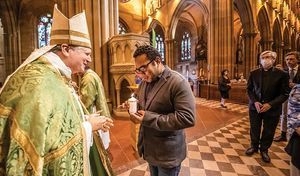
Extract from David Ryan, Catholic Weekly, 4 February 2021
Chris Lee, Sydney’s youngest plenary delegate receives the light of the Plenary candle from Archbishop Anthony Fisher OP. Aged 27, Mr Lee will share the perspectives and hopes of Catholic youth in the metropolis; perspectives that are yearning for earnest Christian expressions of faith.

Extract from CathNews, The Age, 3 February 2021
Doctors and psychiatrists want the Andrews Government to make changes to its plan to ban gay conversion therapy, due to concerns it will discourage some practitioners from treating vulnerable patients. The Victorian branches of the Australian Medical Association and the Royal Australian and New Zealand College of Psychiatrists say the proposed legislation is too broad and the sanctions are too severe. The bill to criminalise gay conversion practices, which will be introduced to the upper house tomorrow, includes penalties of up to 10 years in jail and maximum fines of $10,000 for anyone caught trying to suppress or change someone’s sexuality. Kerryn Rubin, chair of the college’s Victorian branch, said he feared the bill would potentially harm some of the most vulnerable people in society, who “need more help not less”. Dr Rubin said the role of a psychiatrist was often to challenge the ideas of their patients and explore the reasons they feel a certain way. He said the draft laws are “too much of a blanket statement” on what is a conversion practice versus exploratory therapies. The Victorian branch of the AMA has also raised its concerns with the Government but has yet to receive a response. This comes as faith-based organisations ramped up their opposition to the bill yesterday. More than 75 Christian protesters held a demonstration at Parliament House.....(more). Photo: Dr Kerryn Rubin feared bill potentially harm vulnerable Bigstock, CathNews 20210203
Extract from The Age, 2 February 2021
Rank-and-file Catholics are throwing their support behind Daniel Andrews’ plan to ban gay conversion practices and demanding the church rethink its “outdated” views on sexuality. As the Victorian Parliament returned this week to resume debate on the government’s controversial bill, a split has emerged in the Melbourne archdiocese, where Archbishop Peter Comensoli opposes the legislation, while members of his church have strongly rejected his claims that the bill attacks religious freedom. “The science has changed but the church is still holding onto a false assumption of homosexuality as physically or morally deviant,” said Peter Wilkinson, president of Catholics for Renewal, a group of lay Catholics who are seeking to reform the church after years of abuse scandals. “It is our hope that the passage of this bill will stir the official Catholic Church to recognise such moves as reflections of the signs of the times, calling upon it to rethink its now-outdated teaching on diverse sexualities.”....(more)
Extract from Another Voice, J.A.Dick, Reflections about Contemporary Christian Belief and Practice, 29 January 2021
Catholics now make up about 20% of the US population – down from close to 24% in 2007 – but the American Catholic Church is still larger than any other single religious institution in the United States. Catholics in recent years, however, have faced a number of significant challenges: an ongoing decline in membership, a shortage of priests, major financial problems, and continuing revelations of clerical sexual abuse. The US Catholic Church has experienced a greater net membership loss than any other US religious group. Like contemporary US society, American Catholics, are also highly — and often heatedly — polarized. Edison Research exit polls estimate that 52% of all Catholic voters went for Biden this past November, and 47% for Trump. The Edison exit polls in 2016 showed a 46% Catholic vote for Clinton, and 50% for Trump. US Catholic bishops, with just a few exceptions, have been strongly supportive of Donald Trump, and critical of Democrats and now President Joseph Biden. New York’s Cardinal Timothy Dolan, who gave the invocation at his inauguration, has been a strong supporter of his “great friend” former president Donald Trump. Cardinal Raymond Burke, former Archbishop of St. Louis and a former Vatican official, is probably the de facto leader of the Church’s conservative wing. He calls Democrats the “party of death.” This past autumn, when interviewed on the conservative Catholic show “The World Over,” he described the then presidential candidate Joseph Biden, as involved in a “grave, immoral evil that is the source of scandal.” The former archbishop of Philadelphia, Charles Chaput (the first archbishop of Philadelphia since 1921, by the way, to not have been made a cardinal), said, in December 2020, that President-elect Joe Biden should be banned from receiving communion because of his support for abortion rights and same-sex relationships......(More)

Extract from Lisa Zengarini, Catholic Voice, 25 January 2021
Catholic Bishops of Australia are calling on the government to ratify the Treaty on the Prohibition of Nuclear Weapons, saying the elimination of nuclear arms would contribute significantly to world peace. Bishops in Australia have urged the Government to join the UN Treaty on the Prohibition of Nuclear Weapons (TPNW), which seeks for the first time to establish a comprehensive ban on the development, testing, production, stockpiling, stationing, transfer, use and threat of use of nuclear weapons. The Treaty was adopted in 2017 and came into force on 22 January. Until now, it has been ratified by 51 States, including the Holy See. Australia, however, is amongst the countries which haven’t signed it. In a letter to Prime Minister Scott Morrison, Bishop Terry Brady, Delegate for Social Justice in the Australian Catholic Bishops Conference (ACBC), called on the government to do so, explaining that the elimination of nuclear weapons would be a major step towards creating peace in the world. “Experience has taught us that the threat of mutual destruction – with the possibility of the total destruction of humankind and our common home – cannot provide a foundation for peace and security in the multipolar world of the twenty-first century,” the prelate writes. He adds that nuclear weapons “are incapable of addressing terrorism, asymmetrical conflicts, cybersecurity, ecological problems, or poverty.” Highlighting that any use of nuclear weapons “is clearly immoral as they are inherently indiscriminate and their impact is uncontainable in time and space,” the letter notes that the continued availability of nuclear weapons “poses an unacceptable risk of deliberate or accidental use, and it diverts resources from the things that positively foster peace.”....(more). ACBC Media blog HERE. Photo: Lanterns with messages of peace at Nagasaki peace park ANSA Catholic Voice 20210125
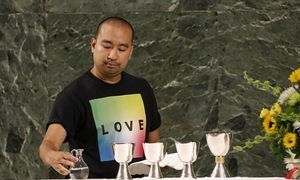
Extract from Michael J. O’Loughlin, America, The Jesuit Review, 25 January 2021
A group of U.S. Catholic bishops, including a cardinal and an archbishop, have signed a statement of support for L.G.B.T. youth, telling them, “God created you, God loves you and God is on your side.” “As we see in the Gospels, Jesus Christ taught love, mercy and welcome for all people, especially for those who felt persecuted or marginalized in any way; and the Catechism of the Catholic Church teaches that LGBT people are to be treated with ‘respect, compassion and sensitivity,’” reads the statement, released by the Tyler Clementi Foundation, an organization that fights L.G.B.T. bullying in schools, workplaces and faith communities. Among those signing the statement were Cardinal Joseph Tobin, archbishop of Newark, and Archbishop John Wester, who leads the Archdiocese of Santa Fe. “All people of goodwill should help, support, and defend LGBT youth; who attempt suicide at much higher rates than their straight counterparts; who are often homeless because of families who reject them; who are rejected, bullied and harassed; and who are the target of violent acts at alarming rates,” the statement continues. A group of U.S. Catholic bishops, including a cardinal and an archbishop, have signed a statement of support for L.G.B.T. youth, telling them, “God created you, God loves you and God is on your side.” “The Catholic Church values the God-given dignity of all human life and we take this opportunity to say to our LGBT friends, especially young people, that we stand with you and oppose any form of violence, bullying or harassment directed at you.” Archbishop Wester said in a phone interview with America that he signed the statement because he wanted L.G.B.T. young people to know “you have worth, you have value and you’re a child of God.” A former high school teacher, Archbishop Wester said bullying can be especially toxic for young people who are trying to come to terms with their sexual orientation, especially when either they or others misinterpret church teaching on homosexuality to convey the notion that being gay itself is sinful. The Catholic Church teaches that homosexuality is “objectively disordered” and condemns sexual acts between people of the same sex as sinful. But at the same time, it says that gay people “must be accepted with respect, compassion, and sensitivity. Every sign of unjust discrimination in their regard should be avoided.” Archbishop Wester said young L.G.B.T. people may sometimes misinterpret church teaching about homosexuality and incorrectly think they are somehow cut off from God’s love as a result. Archbishop Wester said that he signed the statement because he wanted L.G.B.T. young people to know “you have worth, you have value and you’re a child of God.” “We have our teachings, which we prize and cherish, but those teachings need to be understood in the proper context of love and mercy,”....(more) Photo: America, Jesuit Review 20210125 CNS photo Gregory A. Shemitz

Limited extract from Robert Mickens, subscription journal, La Croix International, 23 January 2021
The pontificate of Pope Francis has now surpassed that of Benedict XVI in terms of duration. And Benedict has now been a "former" pope longer than he was actually the Roman Pontiff. The latest milestone comes during the eight-day Week of Prayer for Christian Unity, the "octave" when Christians ask God to guide them in healing the divisions that keep their various separated Churches and communities from realizing full communion. It is part of the ecumenical movement, which is aimed at fostering deeper relations between the different Christian denominations. Its eventual goal is the restoration of the full, visible unity of all who believe in Jesus Christ and strive to truly be his disciples. But the work of ecumenism is severely hampered by divisions within the various denominations themselves. Sadly, every Christian Church and ecclesial community has them. The fractures within the worldwide Orthodox Church are well-known. The Anglican Communion, which is both praised and ridiculed for tolerating vastly different doctrinal positions among its members, has also incurred splits. And the Roman Catholic Church has not been immune to division, either. But until fairly recently its leaders, the bishops, have been amazingly united in an almost lockstep fashion. Singing from the same hymn sheet, until they didn't... There are more than 5,000 bishops around the world. And despite different cultures and languages, they have been strikingly harmonious in singing from the same hymn sheet. After John Paul II imposed a strict litmus test on what type of candidates could be appointed to the episcopate, they have been especially mindful of following the lead set by the Bishop of Rome. They did so, with few exceptions, during the Polish pope's long reign and also during the nearly eight years his Bavarian successor was at the helm. But that changed not long after the Argentine Jesuit, Jorge Mario Bergoglio, was elected to the See of Peter in March 2013. Looking back at the past nearly eight years, one can see that the worldwide episcopate's honeymoon with Pope Francis was brief. That is certainly true with the bishops of the United States......(more). Photo: Vatican at dusk mickens-13677-39 La Croix Int 20210123

Joe Biden’s Catholicism
Extract from Paul Collins, Pearls and Irritations, John Menadue website, 18 January 202
Most of them keep their faith private, but Biden is different; he’s right up-front about his Catholicism. ‘It’s foundational to who he is,’ his long-time friend, Senator Chris Coons of Delaware says. Coons also says that Biden’s stances on social justice, race, refugee and environmental issues are informed by ‘a deeply rooted sense of fairness’ that he learned from his parents and his Catholic formation. He has profoundly assimilated the Christian sense of the importance of the community over individualism, of putting others before self, and he sees politics in the words of Pope Francis ‘as something more noble than posturing, marketing and social spin.’ As well as the Catholic tradition of social justice, his faith is deeply rooted in the church’s spirituality and practice. He attends Mass every Sunday and quite often on weekdays. He prays regularly, often quotes the bible in political speeches and even publicly bursts into popular hymns, as he did in his November 7, 2020 victory speech when he quoted Michael Joncas’ hymn On Eagle’s Wings. ‘In the last days of the campaign,’ he said, ‘I began thinking about a hymn that means a lot to me and my family, particularly my deceased son Beau. It captures the faith that sustains me and…I hope it can provide some comfort and solace to the…Americans who have lost a loved one through this terrible virus this year.’ He then quoted the first verse:.....(more). Photo: Paul Collins
Limited extract from Christa Pongratz-Lippitt, Subscription journal La Croix International, 11 January 2021
President of Catholic bishops' conference in Germany says local Churches must be allowed to find solutions to pressing questions like the diaconate for women. Bishop Georg Bätzing, head of Catholic episcopal conference of Germany (DBK), has vowed to work "in close cooperation with the Vatican" as he forges ahead with his country's synodal procedure for Church reform. "I have already had talks in the Vatican about this and plan to continue the discussions when I go down to Rome with the synodal procedure presidium as soon as possible," Bätzing said in an interview published January 3 by the Catholic news agency KNA. The 59-year-old bishop, who has been DBK president since last March, said he plans to keep Vatican officials informed of the developments of the synodal procedure (also known as the Synodal Way) and not just its results. He also announced that Cardinal Mario Grech, the 63-year-old Maltese prelate who recently took over as secretary general of the Synod of Bishops in Rome, "will come and see us, perhaps for our second synodal meeting". Following Vatican Council II The DBK president said this would allow the cardinal to see first-hand that the German Church's endeavors for reform are based on the Second Vatican Council (1962-65) in the tradition of the Würzburg Synod (1971-75). Many of the demands of that national synod in the 1970s -- such as admitting women to the diaconate and opening the priesthood to married men -- have not been implemented by Rome to this day. Bishop Bätzing said these suggested reforms, like the ongoing synodal procedure, are still being discussed and debated. Thus, he said he could understand that many Catholics were restless. "The great majority of committed Catholics in our country want change and that is why the synodal procedure is so essential," said the DBK president, who has headed Limburg Diocese just north of Frankfurt since 2016. He warned that if the Church did not answer the "pressing questions", it would lose credibility. Women's ordination was one such pressing question, Bätzing said in a long interview in the January issue of the German theological monthly Herder Korrespondenz. Church's official explanation is "less and less convincing" He said he always tried to do his best in explaining honestly the current Church teaching on the subject.....(Source)
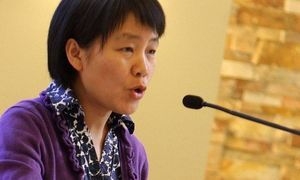
Extract from Christopher Lamb, The Tablet, 11 January 2021
Pope Francis has changed Church law officially to recognise female ministry and allow women to be instituted into roles previously reserved to men. In a ruling on 11 January, Francis amended Canon Law so that women can become lectors and acolytes, which are both public ministries. The role of lector reads the scriptures during Mass while an acolyte assists a priest as an altar server. One significance of the change is that until now it was mainly seminarians who were instituted into these positions in a formal ceremony carried out by a bishop. Both lector and acolyte roles are seen as staging posts on the path to the priesthood. In practice, however, Francis is codifying what is already happening across the world. Women are often seen reading at Mass, while female altar servers are long-established. Nevertheless, church law had previously stated that only “lay men” could hold the lector and acolyte positions and Francis has now changed the wording to “lay people”. The real impact of the Pope’s reform is in the symbolic significance of recognising women’s roles. “This is the first official document in modern times to allow women across the altar rail during the Mass,” Phyllis Zagano, an academic from Hofstra University who has written extensively about the role of women in the Church, told The Tablet. “They are formally stating that women are equally human to men in terms of liturgical action.” Explaining the changes, the Pope said he was following the reforms of the Second Vatican Council which saw “an urgent need” to “rediscover the co-responsibility of all the baptised in the Church.” The change, he added, has also been recommended by some synod of bishops gatherings, including the 2019 meeting on the Amazon region where women are already heavily involved in leading church communities....(More). Photo: Women Acolyte Lector CNS Gregory A Shewmitz The Tablet 20210111
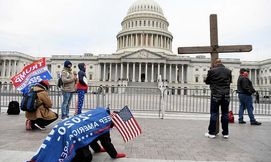
Extract from Mark Coleridge, America, The Jesuit Review, 11 January 2021
The way in which Catholic bishops engage with the political process in Western liberal democracies is the fruit of a long and complex history. With the demise of Christendom and the loosening of the bond between throne and altar, popes and bishops have had to reorder their relationships to the secular order. This has meant a certain detachment from the political process and even a reluctance to be seen interfering in politics. The separation of church and state was a hard-won achievement in the West, and by and large it has worked to the benefit of both. It does not mean total separation, but it does mean that the relationship between the secular and the sacral has changed. This shows itself in the detachment of church leaders from the business of lawmaking and government—except when in the defense of church teachings and interests. But bishops are quick to speak and act, for instance, on life issues (such as abortion and euthanasia), on religious freedom and on questions having to do with marriage and the family. To those we might add issues of sexuality and gender. So, too, they are quick to intervene when it comes to Catholic schools, hospitals and welfare agencies. They are also keen to play both sides of the political aisle, in part to foster social amity but also because they know that the electoral wheel turns; if they attach themselves too closely to one side of politics, they will pay a heavy price when the wheel does turn. As a prudential arrangement, this has worked well enough in most circumstances. But there have been moments in recent history when it has broken down and left the bishops seeming to be impotent bystanders or even unconscious collaborators. Think of Hitler’s Germany, where all accepted norms were cast aside and the beast was unleashed. Papal and episcopal attempts to deal with the beast missed the mark: Something new and different was needed.....(more) Photo: Trump Supporters pray outside Capitol 6 January 2020 CNS photo Mike Theiler Reuters America Jes. Rev. 20210111

Francis has encouraged people "not to let ourselves be imprisoned by those imaginary specters that stifle hope"
Limited Extracts from Loup Besmond de Senneville, subscription journal La Croix International 7 January 2021
Pope Francis, who's Christmas and New Year liturgical celebrations were severely curtailed by measures to stop the spread of the coronavirus, has invited believers to put aside their "weariness and complaints". While celebrating Mass in St. Peter's Basilica on January 6 -- still observed in Italy and some other parts of the world as the Feast of the Epiphany -- the pope urged a small crowd of worshipers to reflect more deeply on the significance of the Magi. He said their visit to the crib is an invitation to raise one's gaze to "escape the bottleneck of a narrow way of seeing things". Francis said it was also a summons "to cast off the dictatorship of the self, the constant temptation to withdraw into ourselves and our own concerns".......The pope encouraged them and all Catholics to learn from the Magi and "devote more time to worship… to learn ever better how to contemplate the Lord". "To worship the Lord, we first have to 'lift up our eyes'. In other words, not to let ourselves be imprisoned by those imaginary specters that stifle hope, not to make our problems and difficulties the center of our lives," Francis insisted. "This does not mean denying reality, or deluding ourselves into thinking that all is well," he added. On the contrary, he encouraged people to view "problems and anxieties in a new way". "When we lift up our eyes to God, life's problems do not go away, no; instead we feel certain that the Lord grants us the strength to deal with them," Francis said.....(source). Photo: Pope Francis Epiphany in St. Peter's Basilica KAMIL JASINSKI EPA MAXPPP La Croix 20210107
Extract from Christopher White, National Catholic Reporter, 6 January 2021
As the U.S. Capitol was taken over by insurrectionists on Jan. 6 seeking to disrupt the certification of the Electoral College votes to formally declare Joe Biden the winner of the presidential election, a number of Catholic bishops took to Twitter to call for prayer and peace, with a few specifically condemning the siege of the Capitol by a violent mob. "Today's events show the immensely perilous pathway of division and polarization that our country has embarked upon in these past four years," San Diego Bishop Robert McElroy told NCR. "We need to begin immediately a moral and spiritual regeneration in the public and political realms that touches the hearts of Americans and helps us all to see through the prism of this terrible assault on our democracy," he added, saying that the country must embrace dialogue over division as it seeks to move forward. Unlike some Catholic leaders in recent weeks who have said President Donald Trump's refusal to accept the election results did not pose a threat to democracy, McElroy did not mince words at identifying what he sees as the root cause of the day's events. "We must be clear in identifying this moment as the logical trajectory of the last four years of President Trump's leadership of our country and stare in the face how we have stood by without giving greater witness to the terrible danger that leadership rooted in division brings to a democratic society." "Today we see the face of insurrection in the United States in a way that we have never witnessed in the last hundred years," said McElroy. "It is ugly and calls us to action." Over the last six weeks, some right-wing Catholics have joined forces with evangelicals in rejecting the election outcome. In December, when protestors rallied in Washington, D.C. calling for the Supreme Court to throw out the election results, they were joined virtually by a disgraced former Vatican archbishop and a Texas Catholic bishop, along with in-person appearances from several priests and prominent Catholic pro-life activists......(more). Photo: Trump Demonstrators US Capital Building CNS Reuters Mike Theiler NCR 20210106
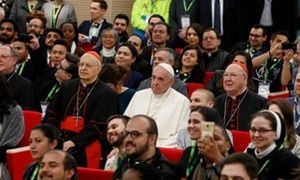
Catholic Church Reform Int'l recently released a survey inviting people globally to describe their experience of Covid-19 and freely share its effect on their experience of church, their place in the human family, and their hopes and dreams for our world. We were interested in knowing whether the experience of the lockdown had changed what is important to them and whether they intended to change anything about their life as they transitioned through the pandemic. Providentially, we find it encouraging that this is also the topic of Pope Francis's newest book: Let us Dream: the Path to a Better Future.
This broad initiative was in response to the Papal Exhortation on the Amazonian Synod,
released in February 2020, just as the Corona virus pandemic began its
global impact. Just as Francis immersed himself into the people and the
culture they live in to understand the obstacles and opportunities they
face, likewise, through this survey, we have attempted to do the same –
really listening to the diversity of voices and seeking the
Spirit-guided perspectives of the People of God. The survey was
conducted from July to September 2020 in five languages (English,
Spanish, French, Italian, and Portuguese) with responses from thirty
countries spanning six continents. While we believe we speak for a
broader group, when we refer to the People of God, we are primarily
reflecting the views of the participants in this survey. The summary result, which we dare to call A Peoples Exhortation,
is a parallel effort to reflect an incarnate journey and to collect
broad perspectives with many points of connectedness. For centuries, the
Catholic Church has tried to make everyone sing one note, but we
believe beautiful harmony can be made from all the different notes....(More) (Context of photo on source page - Pope Francis at Youth Synod).
Extract from Eduardo Campos, Crux Now, 6 January 2021
SÃO PAULO – Archbishop Alberto Taveira Corrêa of Belém, an archdiocese with more than 2 million residents in the Amazon region in Brazil, faces criminal and ecclesial investigations after being accused of sexual harassment and abuse by four former seminarians. The accusations were disclosed by the Brazilian edition of the Spanish newspaper El País at the end of December and became a high-profile scandal on January 3, when TV Globo’s weekly news show Fantástico aired a report on the story. The names of the former seminarians have not been revealed. All of them studied at the Saint Pius X seminary in Ananindeua, in Belém’s metropolitan area, and were between 15 and 20 years old when the alleged abuse happened. According to the alleged victims, Corrêa usually held in-person meetings with seminarians in his residence, so they didn’t suspect anything when they were invited by him. One of them, identified as B. in El País’s story, used to frequent Corrêa’s house for spiritual guidance, but the harassment began after the seminary discovered he had a love affair with a colleague. He was 20. According to the report, B. asked Corrêa’s help and the archbishop said that the young man had to comply with his spiritual healing method......(more)
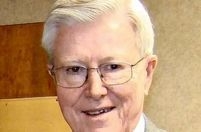
The retired auxiliary bishop of Sydney, a staunch defender of abuse victims, has died at age 83
Limited Extract from Michael Kelly SJ, subscription journal la Croix Int. 4 January 2021
Saying farewell to Bishop Geoffrey Robinson, who died this past December 29, is saying goodbye to one of the few Australian Catholic bishops with his integrity and reputation for honesty still intact. He championed the defense of the weak and the abused. He was outstandingly intelligent and compassionate. He lent his considerable knowledge of Church law to ease the burden of those who suffered the effects of failed marriages. He focused on what is essential in Christianity by his very accessible, popular commentaries on the Synoptic Gospels. His commentaries were well appreciated by preachers and believers of all denominational allegiance. While our paths overlapped from time to time, it is what Bishop Robinson will be best remembered for most – caring for and promoting the rights of children abused by Catholic officials, including priests – that brought about a very significant intersection of our paths in 1997. I vividly recall the day I was in Melbourne in 1997 and Geoff called me from Sydney on my recently acquired mobile. He was then the auxiliary Catholic bishop of Sydney (1984-2004) and champion of justice for victims of clerical sexual abuse. He was ringing me to get advice on how to settle a score with a journalist and have a record corrected. He was furious with a young reporter from Rupert Murdoch's The Australian over a report Geoff had presented the previous day on his work with victims of abuse. It was the first of what became annual reports on what Church authorities were doing to improve management procedures, supervise the processing of complaints and remove pedophiles from its workforce. But Geoff was responsible for the care of victims and seeing they got some justice from Church authorities, not supervising miscreant clerics, disciplining them or seeing to their removal from the workforce.....(source). Photo: Bishop Emeritus Geoffrey Robinson Dr Ingrid Shafer La Croix 2021010